175 Random Facts So Interesting You’ll Say, “OMG!”

One of the best things about being a human being is collecting all kinds of random knowledge and trivia throughout our lives. Random fun facts are great for breaking the ice, impressing a date, and winning a pub quiz. But there’s you don’t have to have a use for this little tidbits of mind-blowing information to make knowing them worthwhile. Just reading these totally random facts about science, history, food, celebrities, your body, the cosmos, and more will make your jaw drop at least once. And for more out-there oddities, here are 50 Wonderfully Weird Facts That Will Make You Question Everything.
1
More human twins are being born now than ever before.

Do you get the feeling that there are more twins around these days than there used to be? No? Well, you should, because according to a new study in the journal Human Reproduction, the “twinning rate” has increased by one-third since the ’80s—up from 9 to 12 twins per 1,000 deliveries. Currently that adds up to about 1.6 million twins born each year across the world—meaning one out of every 42 babies is a twin. Helping drive this is the increasing use of medically assisted reproduction, and the delay in childbearing (twinning has been found to increase with a mother’s age). For more pieces of trivia to impress your friends, here are 50 Facts So Strange You Won’t Believe They’re True.
2
A narwhal’s tusk reveals its past living conditions.
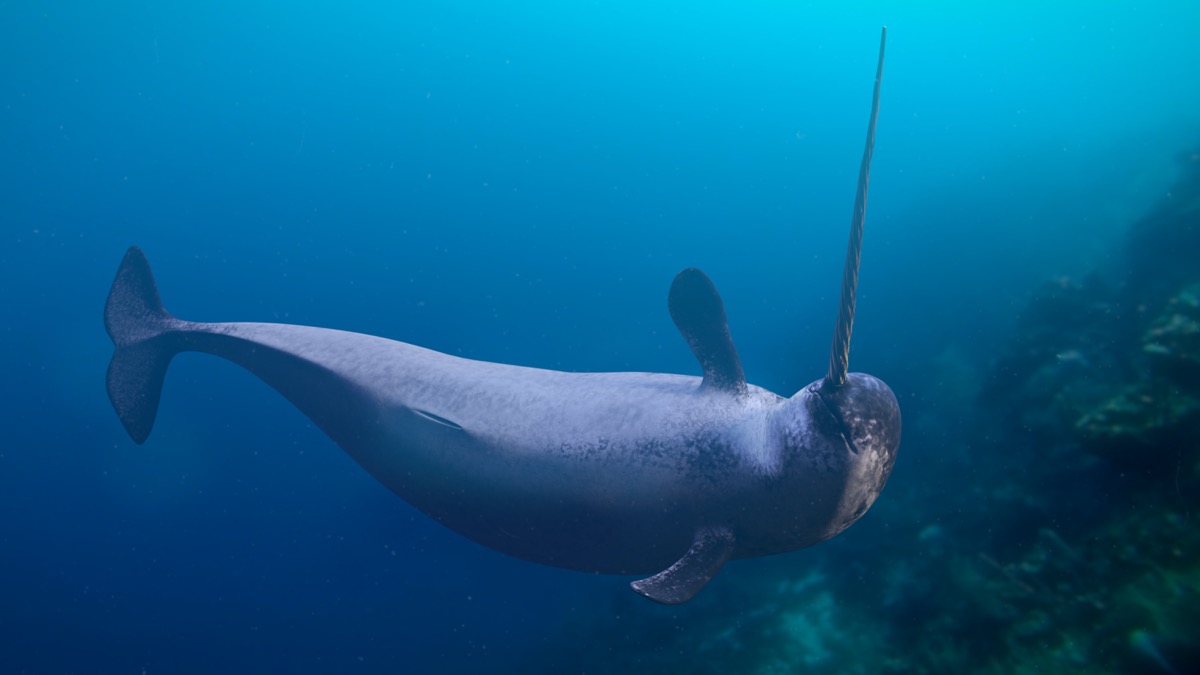
Much like the rings of a tree can tell you its age and provide clues about the life it has lived, so too does the long tusk of the narwhal. Recent research led by a bioscience professor at Denmark’s Aarhus University has shown that this peculiar arctic whale adds a layer to its distinctive tusk each year. And not only do these layers offer insight into the age of the narwhal (they’ve been known to live up to 50 years) but the conditions in which they lived—such as level of pollution, temperature levels, and even what their diet consisted of. You are what you eat!
3
The first person convicted of speeding was going eight mph.
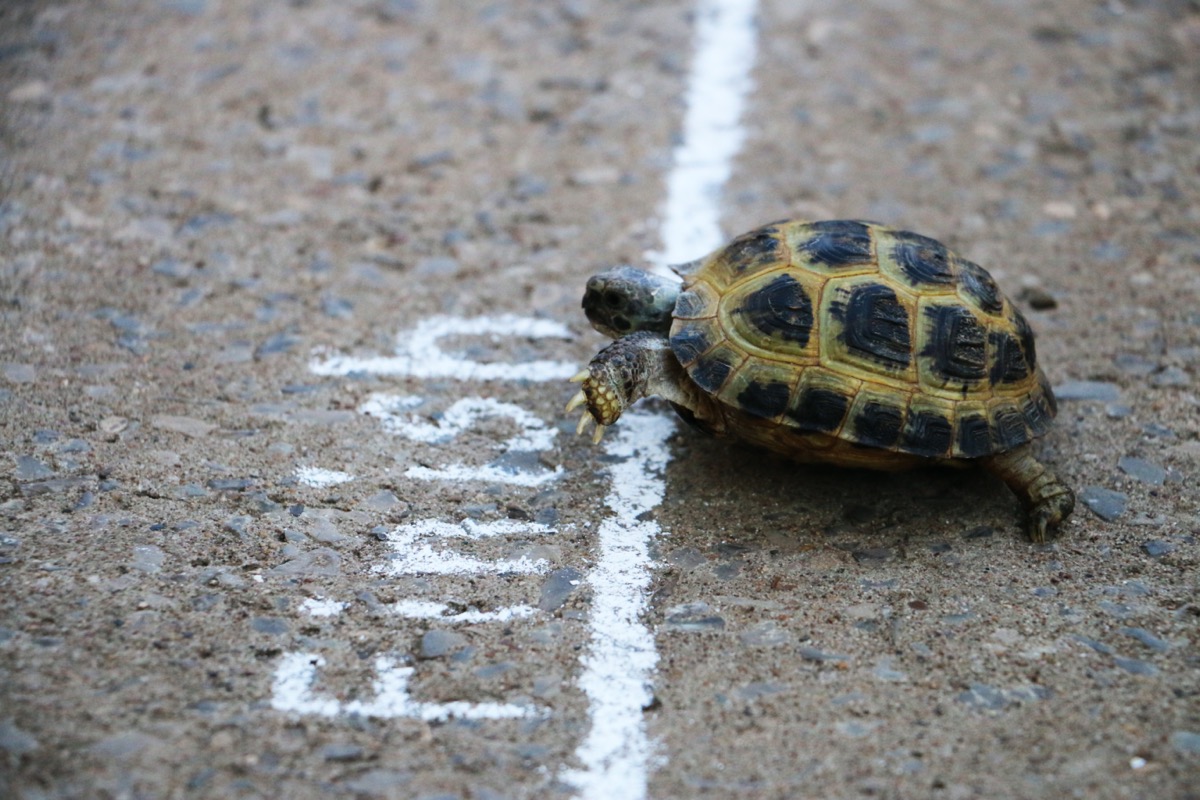
According to Guinness World Records, the first person to be charged with speeding was Walter Arnold of the English village of Paddock Wood, Kent. On Jan. 28, 1896, Arnold was spotted going four times the speed limit in his 19th-century Benz—but since the speed limit at the time was just two miles per hour, that meant he was not going too fast by today’s standards. The constable had to chase him down on his bicycle, issuing a ticket for £4 7s and earning Arnold the speedy distinction. For more trivia to impress, here are 40 Random Obscure Facts That Will Make Everyone Think You’re a Genius.
4
“New car smell” is the scent of dozens of chemicals.

Few odors are as pleasing as “new car smell“—and not just because it’s nice to be in a brand new car. But while the scent may be strangely satisfying, the fact is that it’s pretty much just a combination of 50+ chemicals (known as “volatile organic compounds”) that are released into the car, decaying quickly over time. The concentrations found in a typical new car aren’t dangerous, but among the VOCs that make up much of that new car smell are those found in nail polish, auto fuel, and petroleum.
5
The world wastes about 1 billion metric tons of food each year.

Food waste is a huge problem. How big? About 931 million metric tons. That’s how much food that researchers with the United Nations estimate was wasted in 2019, according to the Food Waste Index Report 2021, which surveyed 54 countries, finding that the majority of wasted food (61%) comes from homes while restaurants and other food services produce 26% of wasted food. Grocery stores make up just 13% of food waste. If you need a pick-me-up, read through these 50 Feel-Good Facts Guaranteed to Make You Smile.
6
The severed head of a sea slug can grow a whole new body.
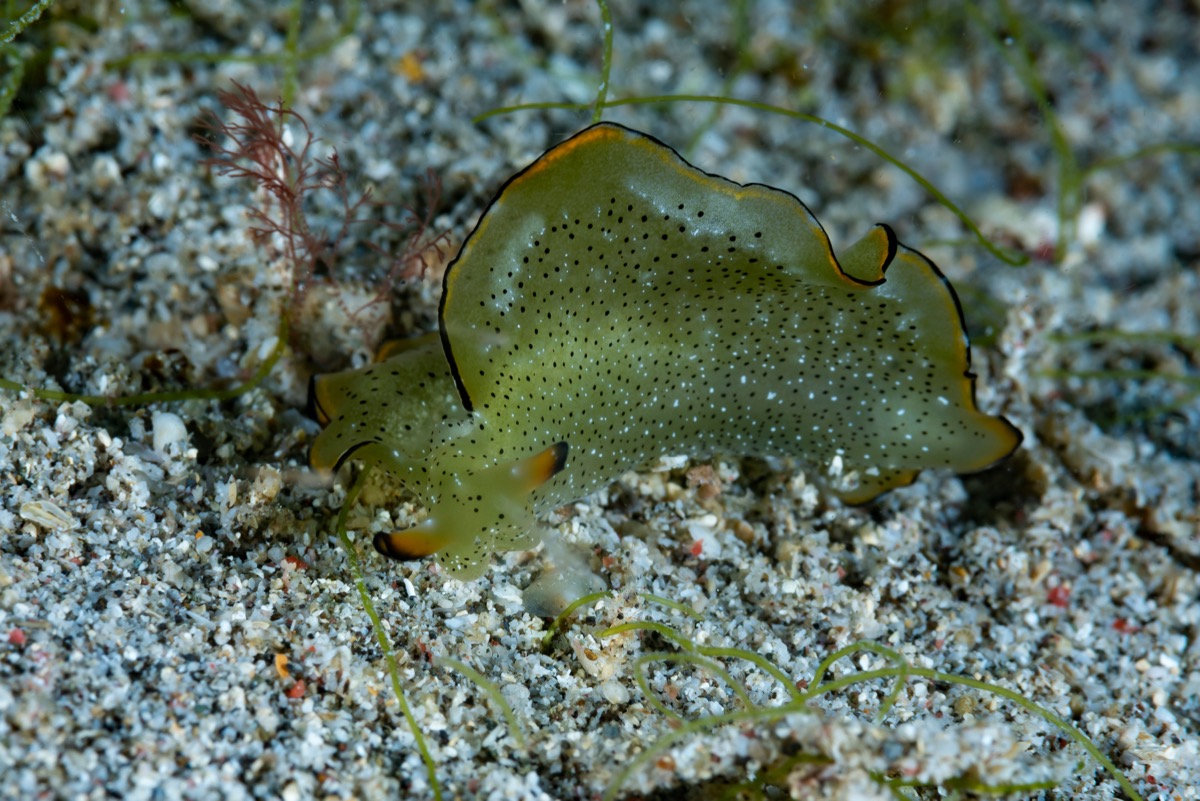
It sounds like something out of a horror film, but it’s all too real: The Elysia cf. marginata, a type of sea slug, has been found to not only survive decapitation, but to be able to grow a whole new body from it. Ecologists at Nara Women’s University in Japan found that, a few hours after having their heads severed from their bodies, the snails’ heads were already nibbling on algae as if nothing had happened. In about 20 days, one-third of the sea slugs studied had fully grown back their bodies—heart included.
7
Hair and nails grow faster during pregnancy.

A surprising side effect of pregnancy is that nails and hair grow faster than usual. This is due to changes in hormones as well as increased blood circulation and metabolism supplying nutrients. According to Amy O’Connor, writing for What to Expect, a pregnant person’s hair also “might feel thicker and look more shiny and healthy than usual.” Though she warns that it can occasionally mean that the expecting “may suddenly sprout strands in places [they’d] rather not.” If you want to question everything you know, check out 50 Well-Known “Facts” That Are Actually Just Common Myths.
8
The world’s smallest reptile was first reported in 2021.
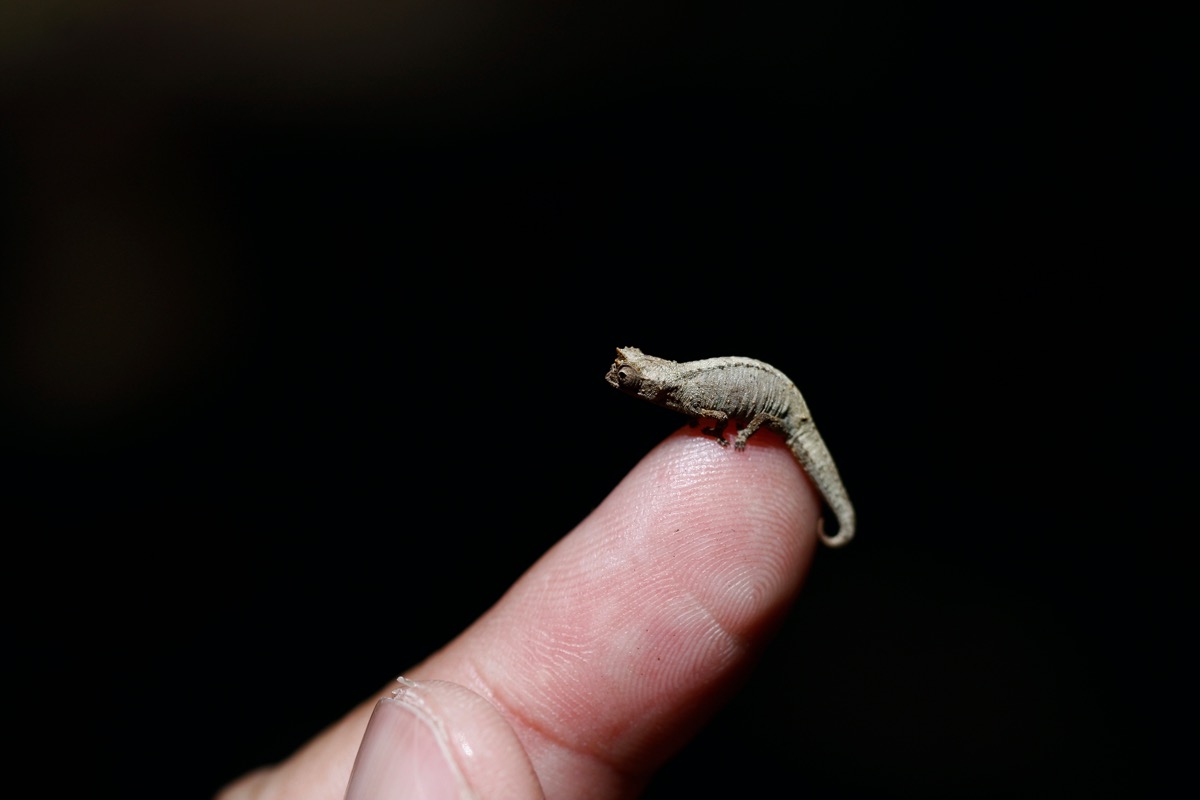
Those who think everything on the planet has already been discovered might just not be looking close enough. A tiny chameleon discovered in northern Madagascar and measuring just 28.9 millimeters is believed to be the smallest reptile on Earth. The itty bitty chameleon was recently discovered and reported in the January 2021 issue of Scientific Reports. But there’s one thing about these critters that’s big for its size: The genitalia of the males measures almost 20% of its body length.
9
Many feet bones don’t harden until you’re an adult.

Feet are enormously complex parts of the body. Each foot contains 26 bones, as well as 33 joints and 19 muscles, which work together to allow for a huge range of motion and movements. But many of these bones remain cartilage throughout a person’s childhood, slowly ossifying into bone as the years go on. According to the Ontario Society of Chiropodists, all of the bones in the foot don’t completely harden until a person is about 21 years old! And for more trivia to keep you sharp, sign up for our daily newsletter.
10
Some sea snakes can breathe through their skin.
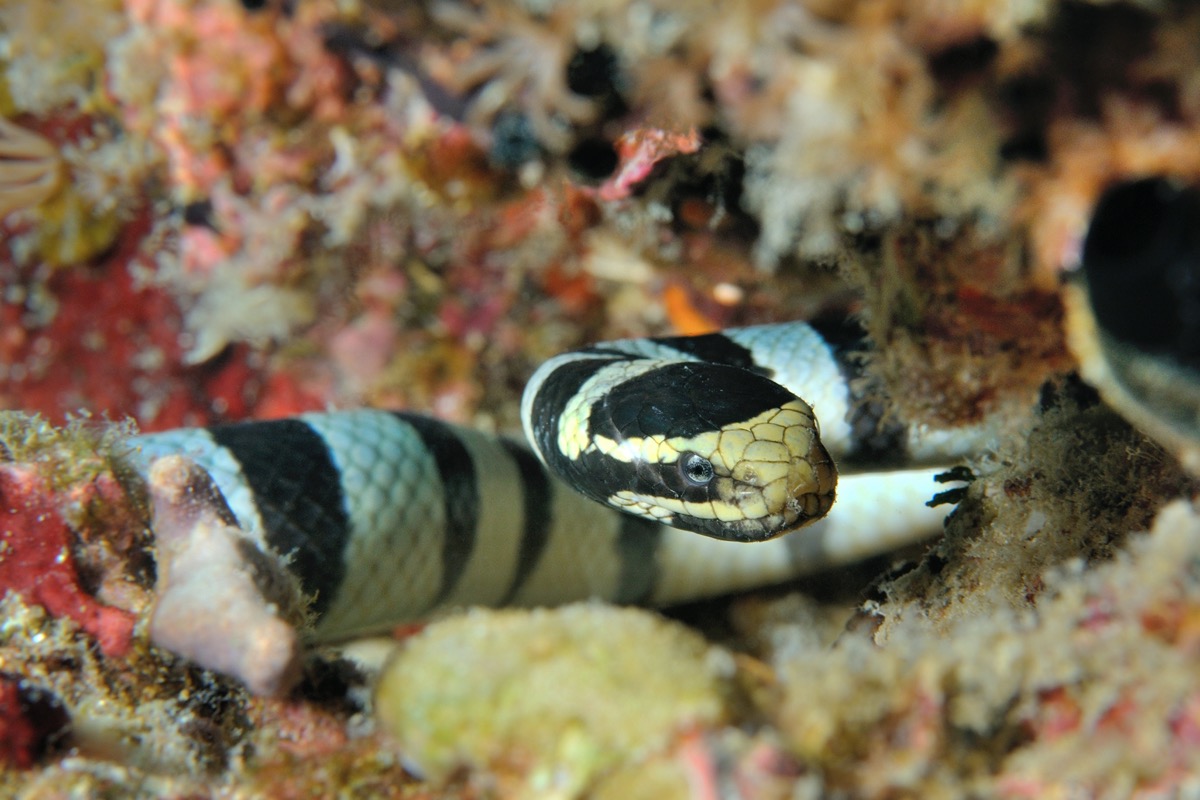
You might think that it’s just fish that have gills, but there are several species of sea snake that breathe through their skin as well. For example, the Hydrophis cyanocinctus has been found to breathe through the top of its own head. It has a small hole and collection of blood vessels at the top of its head for picking up oxygen from the seawater and sending it to the reptile’s brain while it moves underwater.
11
The heads on Easter Island have bodies.

The iconic stone heads protruding from the ground on Easter Island are familiar to most, but many don’t realize what lies beneath the surface. In the ’10s, archaeologists studying the hundreds of stone statues on the Pacific Island excavated two of the figures, revealing full torsos, which measure as high as 33 feet.
12
The moon has moonquakes.

Just as earth has earthquakes, the moon has—you guessed it—moonquakes. Less common and less intense than the shakes that happen here, moonquakes are believed by U.S. Geological Survey (USGS) scientists to occur due to tidal stresses connected to the distance between the Earth and the moon.
13
Goosebumps are meant to ward off predators.

Why do we get goosebumps? In this physiological reaction, small muscles attached to individual body hairs contract, which leads the hair to stand on end. We inherited this ability from our ancestors in part as a way for our (then) coat of body hair to capture air beneath it and in that way retain heat. But, as George A. Bubenik, a physiologist and professor of zoology at the University of Guelph in Ontario, Canada, explained to Scientific American, it also caused our ancestors to appear bigger than they were, helping to ward off predators when they were frightened or on the defense. With modern humans having less body hair, goosebumps no longer cause us to look that much more intimidating.
14
There’s no such thing as “pear cider.”

“Wait,” you’re probably thinking, “I had pear cider last week.” Actually, “cider” is an alcoholic beverage made from fermented apples, and only apples. Alcoholic beverages can be made from pears, but that drink is known as “perry.” The drink was popular in England for centuries but fell out of favor during the second half of the twentieth century. That turned around in the 1990s when the drink was rebranded as pear cider.
15
Pineapple works as a natural meat tenderizer.

The fruit is packed with the enzyme bromelain, which breaks down protein chains, making it an ideal marinade for meats when you don’t have a lot of time. But for the same reason, pineapple does not work for jams or jellies, since the enzyme breaks down gelatin as well. The bromelain is so strong that pineapple processors have to wear protective gloves, otherwise over time the enzyme eats away at the skin on their face and hands, leaving dry skin and small sores.
16
Humans are the only animals that blush.

We are also believed to be the only animal that feels embarrassment—a complicated emotion requiring understanding others’ opinions and other factors. Charles Darwin called blushing “the most peculiar and most human of all expressions,” while Mark Twain said, “Man is the only animal that blushes. Or needs to.”
17
The feeling of getting lost inside a mall is known as the Gruen transfer.

We’ve all heard how casinos are designed to deliberately disorient visitors, causing them to lose track of time and where exactly they are. But did you know that there’s a similar strategy behind the design of shopping malls as well? Officially known as the “Gruen transfer,” this phenomenon was named after Austrian architect Victor Gruen, who identified how an intentionally confusing layout could lead to consumers spending more time and money in a shopping venue (though he would later disavow the approach).
18
The wood frog can hold its pee for up to eight months.

Talk about having to go! Wood frogs in Alaska have been known to hold their urine for up to eight months, sticking it out through the region’s long winters before relieving themselves once temperatures increase. The urine actually helps keep the animal alive while it hibernates, with special microbes in their gut that recycle the urea (urine’s main waste) into nitrogen.
19
The hottest spot on the planet is in Libya.

Specifically, the hottest spot ever recorded on Earth is El Azizia, in Libya, where a temperature of 136 degrees Fahrenheit was recorded on Sept. 13, 1922. While hotter spots have likely occurred in other parts of the planet at other times, this is the most scorching temperature ever formally recorded by a weather station. For more info that will wrinkle your brain, here are 50 Absurd Facts That Will Make You Question Everything.
20
You lose up to 30 percent of your taste buds during flight.

This might explain why airplane food gets such a bad reputation. The elevation in an airplane can have a detrimental effect on our ability to taste things. According to a 2010 study conducted by Germany’s Fraunhofer Institute for Building Physics, the dryness experienced at a high elevation as well as low pressure reduces the sensitivity of a person’s taste buds to sweet and salty foods by about 30 percent. Add that dry cabin air affects our ability to smell, and our ability to taste is reduced further.
21
Your nostrils work one at a time.

When we breathe in and out of our nose during the day, one nostril does most of the work at a time, with the duties switching every several hours. This “nasal cycle” is dictated by the same autonomic nervous system that regulates heart rate, digestion, and other unconscious bodily functions and is the reason why—when our nose gets stuffed up—it does so one nostril at a time.
22
Only two mammals like spicy food: humans and the tree shrew.
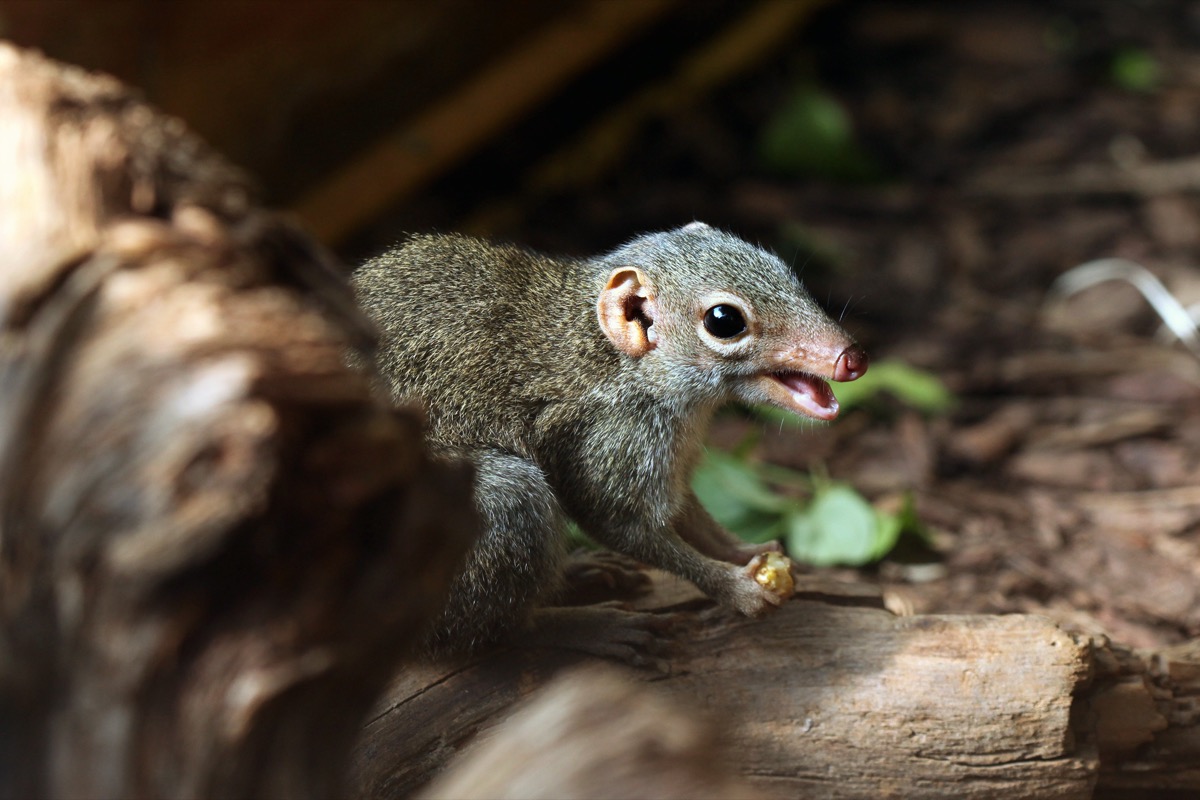
While humans have long had the rare distinction of being the only mammal that actually enjoys spicy food, that list has seen a new addition, as a study by Chinese researchers found that tree shrews have a mutation in their ion channel receptor, TRPV1, which makes it less sensitive to the “hot” chemical in chili peppers. As a result, the adorable critters happily gobbled up corn pellets laced with capsaicin (the compounds that give peppers their spice) while other mammals in the study avoided them.
23
A chef’s toque contains 100 folds.

Most diners are too busy looking at their food to look all that closely at what the preparer is wearing, but the toque—the traditional hat worn by chefs—actually contains exactly 100 folds. This is not just a nice, round number: it is said that these folds represent the number of ways to cook an egg, though an investigation by Bon Appetit failed to track down where that saying originated. Need more distractions? Here are 35 Fascinating Fast Facts for When You’re Bored.
24
Rabbits can’t puke.

Unlike cats or other animals that can cough up hairballs when they digest too much fur and other indigestible materials, rabbits are incapable of spewing. Their digestive system only goes one way, so the furry critters swallow plenty of roughage, which keeps things moving in the right direction.
25
The “M’s” in M&Ms stand for “Mars” and “Murrie.”

That would be Forrest Mars and Bruce Murrie, the two businessmen who created the candy-coated chocolates. The two actually had a very contentious relationship, as Mars leveraged Murrie out of his 20 percent share in the company in 1949—years before M&Ms would become the best-selling candy in the U.S., paying him just $1 million for a share of business that would quickly be worth billions.
26
The human body literally glows.

It might be hard to see with your naked eye, but everyone you pass by every day is literally glowing. The human body emits a small quantity of visible light (“visible” in the technical sense—the illumination is about 1,000 times less intense than levels of light that we would actually be able to see). Researchers in Japan used a special camera to track this glow and found that it fluctuates throughout the day, with the body emitting its lowest levels of light around 10 a.m. and highest at around 4 p.m., a rhythm the scientists attribute to the changes in one’s metabolism.
27
Copper door knobs are self-disinfecting.

Copper and its alloys, such as brass, have long been popular materials for manufacturing door knobs. It turns out, this may not just because the metal’s hue makes it look nice. In fact, the material has been found to kill bacteria. According to one study from the National College of Kathmandu in Nepal, “the metal ions denature protein of the target cells by binding to reactive groups resulting in their precipitation and inactivation. The high affinity of cellular proteins for the metallic ions results in the death of the cells due to cumulative effects of the ion within the cells.” In other words, brass sterilizes the bacteria that can build up from all those (potentially unwashed) hands that grip it.
28
Cotton candy was invented by a dentist.

It is not known whether William Morrison had an ulterior motive for inventing the soft confection, but the dentist no doubt helped ensure others in his profession continued drawing in plenty of customers. In 1897, he partnered with candy-maker John C. Wharton to develop the cotton candy machine (which at the time was known as “Fairy Floss”), and it’s been bringing kids cavities ever since.
29
Marie Curie is the only person to earn a Nobel prize in two different sciences.
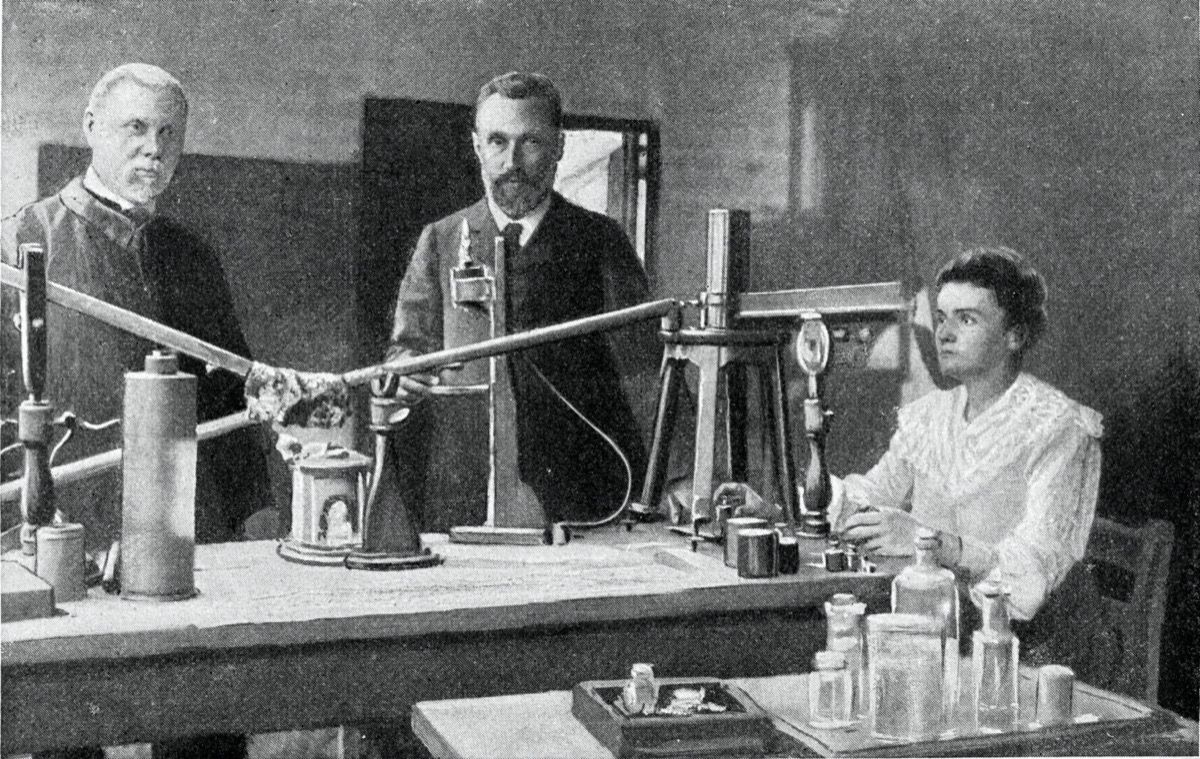
The pioneering researcher won the Nobel Prize in Physics in 1903 (shared with her husband) for her study of spontaneous radiation, and then won the Nobel Prize in Chemistry in 1911 for her work in radioactivity. That makes her one of just six recipients to receive multiple Nobel prizes, and the only person to receive it in two different sciences. (Chemical engineer Linus Paulding earned a Nobel Chemistry Prize and Nobel Peace Prize, but all other multiple winners received theirs in the same category).
30
Fingernails don’t grow after you die.

Despite what you may have seen on other lists of random trivia, your fingernails and hair do not, in fact, continue to grow after you die. To grow, these must have a steady supply of glucose, which is cut off after the heart stops beating, preventing any further growth. In fact, the skin around the hair follicles and nails dehydrates after death and partly retracts, which can make them appear longer.
31
The English word with the most definitions is “set.”

According to Guinness World Records, “set” has the largest number of meanings of any word in the English language, with 430 different senses listed in the 1989 edition of Second Edition of the Oxford English Dictionary. The word “sets” the record with an entry running 60,000 words, or 326,000 characters, and no other English word has come close since.
32
Creedence Clearwater Revival has the most No. 2 Billboard hits—without ever hitting No. 1.
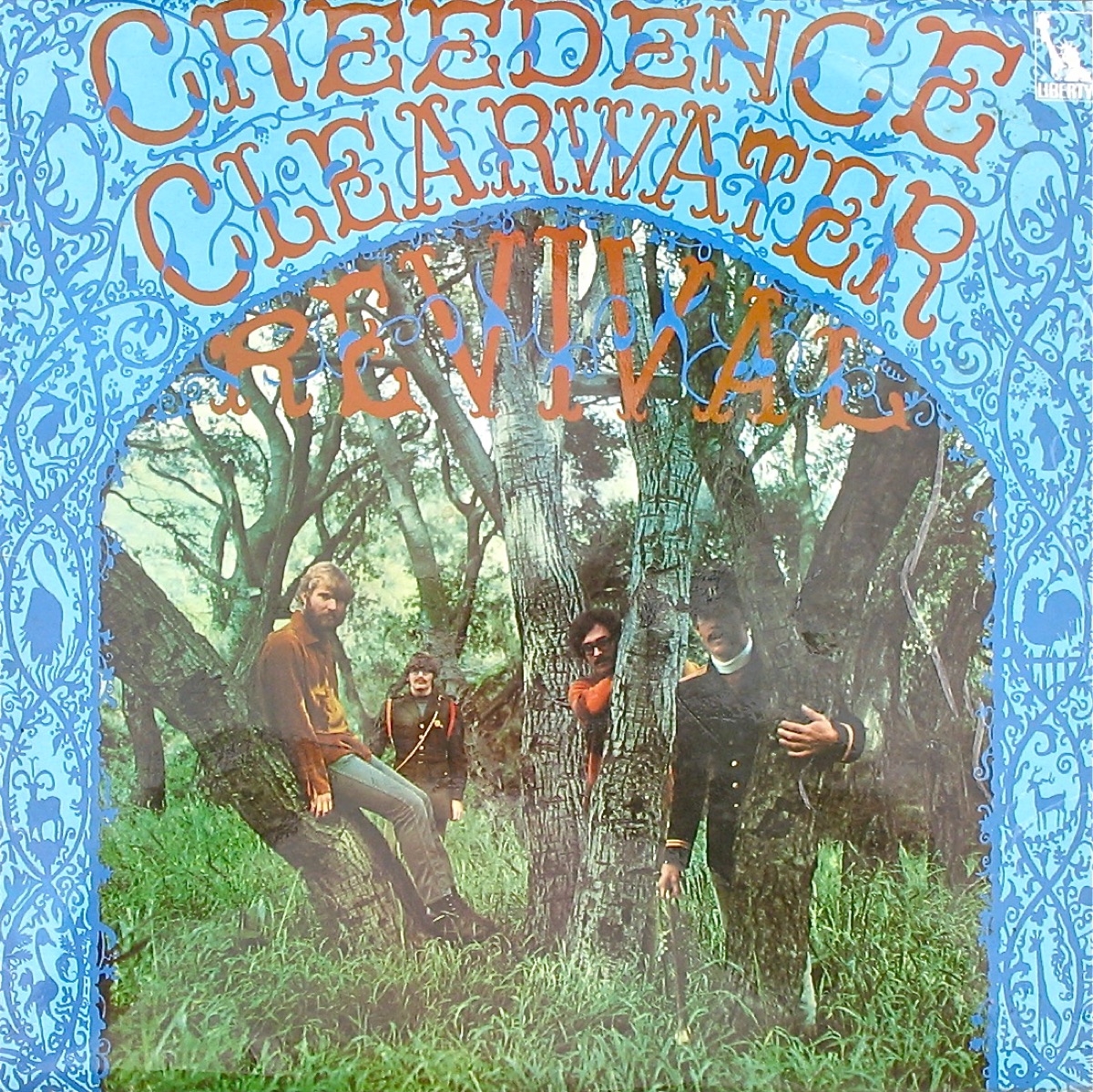
John Fogerty’s swamp rock band has the odd distinction of having seen more of its singles hit No. 2 on the charts, without ever hitting No. 1, than any other musical act. Between March 1969 and Oct. 1970, the band scored five No. 2 singles on the Billboard Top 100—“Proud Mary,” “Bad Moon Rising,” “Green River,” “Travelin’ Band,” and “Lookin’ Out My Back Door”—but never saw one of its songs get to the top spot. No other act has topped this dubious honor since.
33
Pigeons can tell the difference between a painting by Monet and Picasso.

In a 1995 study published in the Journal of Experimental Analysis of Behavior, researchers reported being able to train pigeons to discriminate between paintings by Claude Monet and Pablo Picasso when shown slides of their works that they had previously never seen before. When the Picasso images were inverted, the little art connoisseurs could still tell it was a Picasso. Maybe that’s why they like landing on statues so much.
34
The dot over the lower case “i” or “j” is known as a “tittle.”

That tiny dot above lower case “I” and “j” letters has an actual name: tittle. It is thought that the phrase “to a T” is actually derived from the phrase “to a tittle”—a phrase that was used in the same sense dating back to the early 17th century. (The first recording of the phrase is in the 1607 play Woman Hater by Francis Beaumont and John Fletcher, in which the line reads, “I’ll quote him to a tittle.”)
35
Chewing gum boosts concentration.

Next time you are having trouble focusing, you might want to reach for a stick of gum. A 2013 study in the British Journal of Psychology found that those subjects who chewed gum while taking part in a memory challenge were able to stay focused for longer periods of time than those who did not chew gum.
36
Superman didn’t always fly.
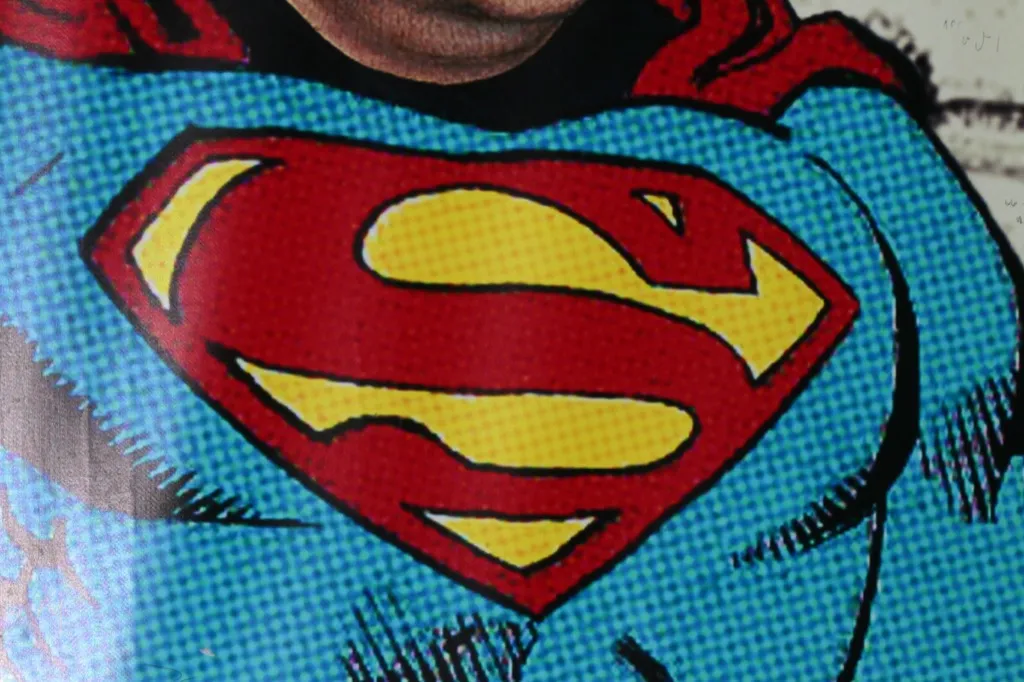
The original comic book Superman could leap tall buildings in a single bound. But then he had to come right back down to Earth—because he didn’t fly. It wasn’t until the 1940s, when animators for a new animated series decided it would be too difficult to routinely draw him bending his knees, that it was decided that Superman could take off into the air. Readers got to see smooth animation, and a superhero gained a new power.
37
The first computer was invented in the 1940s.

These days, supercomputers are everywhere—and they really don’t need much space at all. Have an Xbox One posted up in your living room? That’s a supercomputer. A laptop-tablet hybrid in your bag? That’s a supercomputer, too. (Don’t even get us started on the thing in your pocket…) But when supercomputers first came around, they needed much, much more space. Just take a look at the world’s first one: The Electronic Numerical Integrator and Computer (ENIAC).
Originally built at the University of Pennsylvania’s School of Engineering, in 1946, ENIAC weighed 60,000 pounds and took up a room larger than most studio apartments (1,500 square feet). Shortly after construction, ENIAC was sent off to the military, where it was used to calculate ballistic trajectories (translation: launch missiles) with frightening accuracy. Today, computer experts at Penn credit ENIAC with heralding in the “dawn of the information age.”
38
Space smells like seared steak.
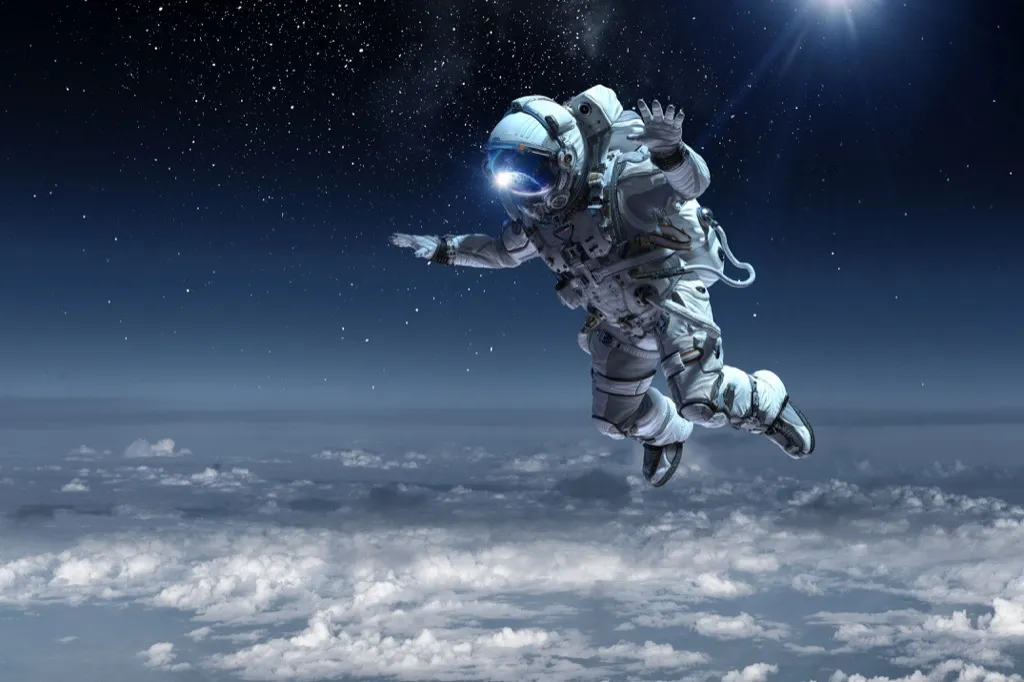
When you see footage of astronauts floating peacefully in space, do you ever wonder, What do space smells like? Well, according to some former astronauts, space does have a distinct odor that hangs around post-spacewalk. They’ve described it as “hot metal” or “searing steak.”
39
The longest wedding veil was the same length as 63.5 football fields.

When Maria Paraskeva, a woman from Cyprus, got married in August 2018, her goal wasn’t just to say “I do.” She was also determined to set a record.
“My dream as a child has always been to break the Guinness World Record title for the longest wedding veil,” she explained. She fulfilled her dream by wearing a lace veil that stretched 22,843 feet and 2.11 inches, or as long as 63.5 football fields.
40
The unicorn is the national animal of Scotland.
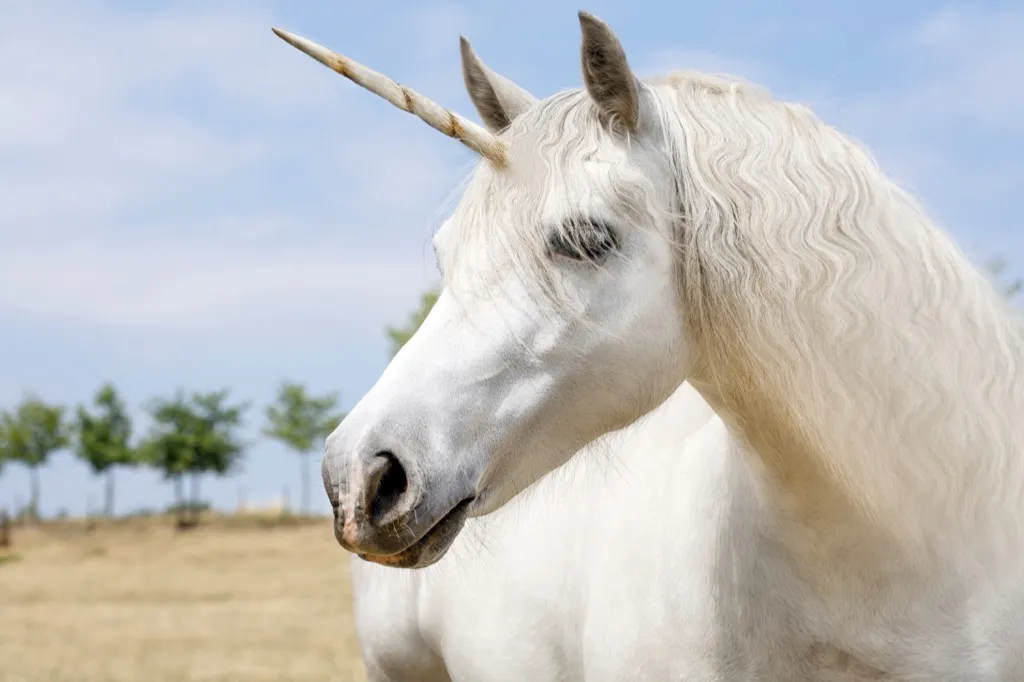
While Scotland proudly boasts the Loch Ness Monster, one of the world’s most famous fabled creatures, the country opted to make another mythical beast its national animal: the unicorn. Although this might seem like an odd choice, Visit Scotland explains that unicorns played an integral role in the country’s history. Back in the 12th century, William I used the “proud beast” in the Scottish royal coat of arms.
41
Bees sometimes sting other bees.

Bees are notorious for their stings, but humans aren’t the only ones who experience this pain in the neck (or the arm, or the leg…). In protecting their hives from outsiders, some “guard bees” will stay by the entrance and sniff the bees that come in, says Marianne Peso from the biology department of Macquarie University. If there’s a rogue bee from another hive trying to steal some nectar, the guard bee will bite and even sting the intruder.
42
Kids ask 300 questions a day.

A 2013 U.K. study from online retailer Littlewoods.com observed young children and recorded the questions they asked the adults around them. The children tended to turn to their mothers for answers, and these moms could end up answering an average of nearly 300 questions per day, or one question every two-and-a-half minutes, the study found. The moms reported that the hardest questions they were asked included “Why is water wet?” and “What are shadows made of?”
43
The total weight of ants on earth once equaled the total weight of people.
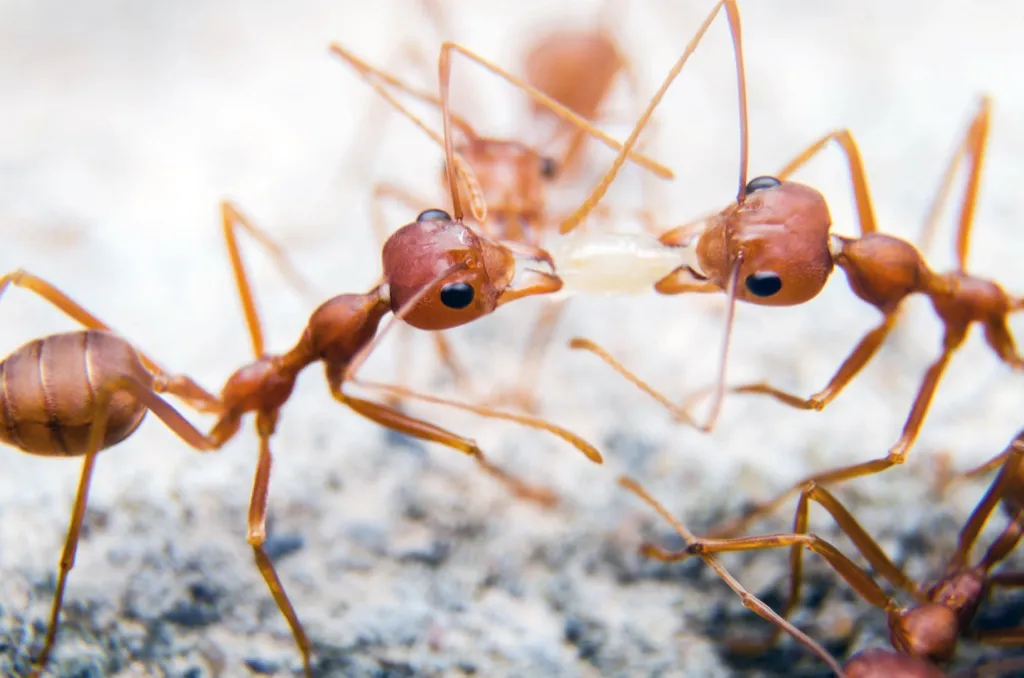
Entomologists have estimated that there are at least one million trillion insects and only one percent of that number is ants, according to the BBC. And if you took all those ants (about ten thousand trillion) and put them on one side of a giant scale, you could almost put all of the people in the world onto the other and balance things out. Unfortunately, as humans have become heavier, this probably wouldn’t hold up today—but it once did. Francis Ratnieks, professor of Apiculture at the University of Sussex, told the BBC this might have held true around 2,000 years ago.
44
“E” is the most common letter and appears in 11 percent of all english words.

Try writing out a few sentences—anything at all. Now take a minute to look at how frequently each letter in the alphabet appears. Chances are you’ll see a lot of the letter “e.” That’s because the commonly used vowel appears in around 11 percent of all words in the English language, according to Oxford Dictionaries. The next most popular letter was “a,” which appears in around 8.5 percent of all words. The least common letter is “q,” which appears in just 0.2 percent of words.
45
A dozen bodies were once found in Benjamin Franklin’s basement.

But were you aware of the fact that multiple skeletons were found in the basement of Benjamin Franklin‘s London home? The bones were discovered during a 1998 renovation of the house and were identified as being from nearly a dozen people, including six children. “The most plausible explanation is not mass murder, but an anatomy school run by Franklin’s young friend and protege, William Hewson,” wrote The Guardian.
That’s not to say there wasn’t any funny business going on. “The resurrection men could deliver bodies stolen from graveyards to the Thames wharf at the bottom of the street, while there was a weekly public execution at the gallows on the other side of the garden wall,” the publication reported.
46
The healthiest place in the world is in Panama.

A small valley near Volcán in Panama has garnered the distinction of being the world’s healthiest place to live, according to a 2018 report by International Living. Called Shangri-La Valley, the area is home to beautiful scenery, a low cost of living, and a significantly longer life expectancy than the surrounding areas. All in all, the world’s healthiest areas have some common factors, according to the ranking: a warm climate, an active social scene, healthy food, and a slower pace of life that makes for less daily stress.
47
A pharaoh once lathered his slaves in honey to keep bugs away from him.

The pharaohs of ancient Egypt were believed to be literally divine. The word pharaoh itself means “great house,” as in the house of God. In fact, King Pepi II, who supposedly ruled for 90 years, thought so highly of himself that when he was bothered by insects, he would command that one of his slaves be covered in honey to lure the flies away from himself.
48
Some people have an extra bone in their knee (and it’s getting more common).

If you were under the impression that the human body had finished evolving, think again. It turns out that some people have a bone in their knee called a fabella. And while this particular little bone with an unknown purpose was once fading away, over the last century and a half, it’s gotten more common. Back in 1875, nearly 18 percent of people examined had a fabella. That number dropped to 11 percent by 1918. However, by 2018, 39 percent of individuals had this mysterious bone.
49
Pringles aren’t actually potato chips.
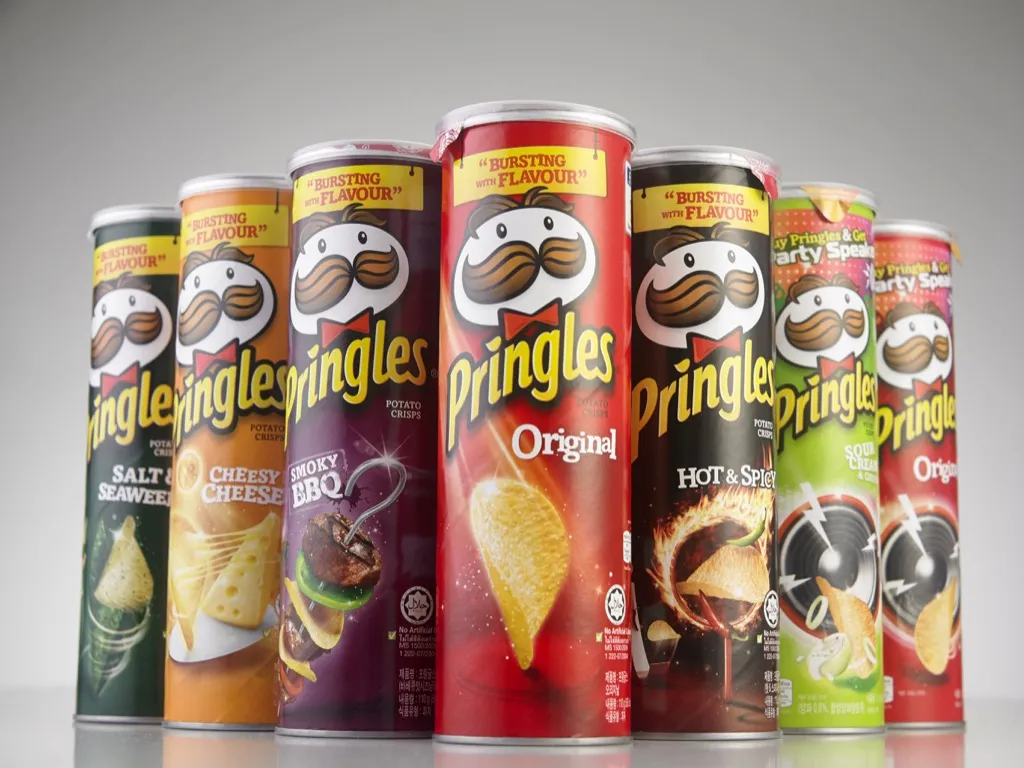
The next time you see a can of Pringles, take a closer look—you won’t see the word “chip” anywhere on the packaging. That’s because Pringles aren’t made of thinly-sliced potatoes, but instead dehydrated potato flakes pressed into their signature parabolic shape. That’s what makes them less greasy. But when other potato chip manufacturers complained, the Food and Drug Administration ruled that Pringles couldn’t be marketed as chips. The company eventually settled on “potato crisp.”
50
There’s a giant fish with a transparent head.
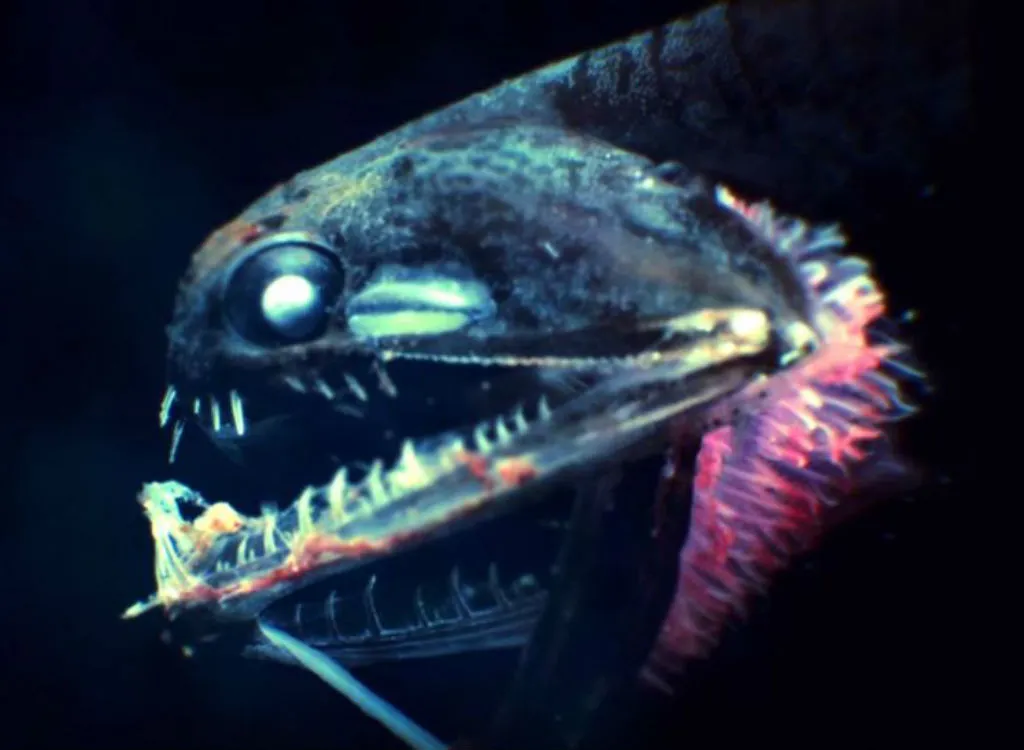
The deepest levels of our oceans are some of the least explored areas of the planet. Because of the extreme pressure, cold, and dark at these depths, only the very strangest of creatures can survive there. These include giant tube worms, vampire squids, goblin sharks, and viperfish with teeth so long that they can’t close their mouths. Perhaps the strangest, though, is the barreleye, a large fish with a completely transparent head.
51
There’s a decorated war hero dog.

While in the trenches of World War I, the U.S. First Infantry Division found themselves unable to communicate with other troops because shellfire had damaged the telephone wires. A young private came up with a unique solution: Rags, a mixed breed terrier whom the soldiers had adopted in Paris, would carry the messages from one division to the next tucked into his collar. He saved many lives, and when Rags passed away—in Maryland, at the very advanced age of 20—he was buried with military honors.
52
Showers really do spark creativity.

Showers aren’t just good for your hygiene—they’re good for your creativity, too. For a 2012 study published in the journal Psychological Science, researchers gave volunteers creativity problems to solve followed by a period of rest. During that period, some were assigned demanding tasks, while others did simpler tasks that allowed their minds to wander (just like a shower does). Those doing the simpler tasks during the resting time were more likely to solve the original creativity problems.
53
Abraham Lincoln’s bodyguard left his post at Ford’s Theatre to go for a drink.

You already know that Abraham Lincoln was shot and killed by John Wilkes Booth while watching a performance at Ford’s Theatre in Washington, D.C., on April 14, 1865. But what you might not have been aware of is that the president had a bodyguard named John Frederick Parker with him on that fateful night, according to Smithsonian Magazine.
Unfortunately, Parker was a police officer with a less-than-stellar reputation. After arriving three hours late for his shift, the officer left his post protecting the president to get a drink at the Star Saloon next door to the theatre. It was during this time that Booth entered the box seats where Lincoln was sitting and shot the president.
54
Dolphins have been trained to be used in wars.

Dolphins are known widely as adorable, intelligent animals. What is not as widely known is that these crafty creatures were used by the U.S. and Soviet Union during the Vietnam War and the Cold War. Both countries studied the creatures for their sonar capabilities, but also trained them to detect mines, bring equipment to divers, find lost equipment, and guard submarines amongst other nifty tricks.
55
Playing the accordion was once required for teachers in North Korea.

The most popular instrument in North Korea is the accordion, so much so that all teachers used to be required to play to get their teaching certifications. Because the accordion is portable in a way that, say, a grand piano isn’t, it was thought of as the “people’s instrument” that could be taken outside and played for laborers in the fields.
56
Children’s medicine once contained morphine.

If you were a baby in the middle of the 1800s and you cried while teething, your parents might have given you Mrs. Winslow’s Soothing Syrup. This “medicine” claimed that “it soothes the child, it softens the gums, [and] allays all pain.” It may have done plenty of soothing, but it was also extremely dangerous—this concoction, like many patent medicines of the time, contained morphine.
57
Plastic Easter eggs and plastic Easter grass were invented by a man who holds more patents than Thomas Edison.

If you’ve ever enjoyed an Easter basket with plastic eggs and grass, then you can thank Donald Weder, the man who invented both. Weder not only holds the patents on these holiday staples, he also holds a total of 1,413 U.S. patents—including ones for water-based inks, flower-pot covers, and decorative wrappers. That’s compared to Thomas Edison, who held just 1,093 U.S. patents.
58
Water makes different pouring sounds depending on its temperature.

If you listen very closely, hot water and cold water sound slightly different when being poured. The heat changes the thickness, or viscosity, of the water, which changes the pitch of the sound it makes when it’s poured. What we feel as heat comes from the molecules of the water moving faster. Cold water is thicker and therefore makes a slightly higher-pitched sound.
59
Most laughter isn’t because things are funny.

Every culture in the world laughs, but surprisingly, most of our laughter isn’t necessarily a response to humor. Less than 20 percent of laughter comes after jokes, according to neuroscientist Robert Provine; the rest is a reaction to regular statements and questions like, “How have you been?” The ensuing laughter, however brief, helps form social bonds since people who laugh together grow closer.
60
One man has saved more than 200 people from suicide.

It’s a sad fact the Golden Gate Bridge in San Francisco is a site where many suicides take place. However, one California Highway Patrol officer has done more to combat this problem than any other individual. Officer Kevin Briggs, who battles depression himself, has personally talked more than 200 people down from the proverbial ledge throughout his career. After retiring in 2013, Briggs wrote a book called Guardian of the Golden Gate and now goes on speaking tours to encourage public discussion of suicide and mental illness.
61
Our European ancestors were cannibals.

In 16th and 17th century Europe, cannibalism was actually a fairly common practice, and it was all for medical purposes. The practice seems to have started because Egyptian mummies were thought to have magical curative properties—so they were ground up and put in many remedies.
As the idea evolved, human bone, blood, and fat were all used in medical concoctions. Got a headache? Crush a skull and make it into tea! While medical cannibalism has fallen out of favor, modern medicine still sometimes uses one human body to heal another in the form of blood donations, organ transplants, and skin grafts.
62
Dogs actually understand some English.

Some owners of disobedient dogs may have trouble believing this, but dogs can learn to recognize a vocabulary of about 165 words. Unsurprisingly, dogs respond best to short words, as well as words with hard consonants like “t” or “r,” which may explain why they can hear “treat” from three rooms away.
If you want to try to expand your dog’s vocabulary, be consistent—for example, always call a meal “dinner” instead of breakfast, lunch, or supper. And don’t believe the myth: Old dogs can learn words just as well as young dogs.
63
You have a nail in your body.
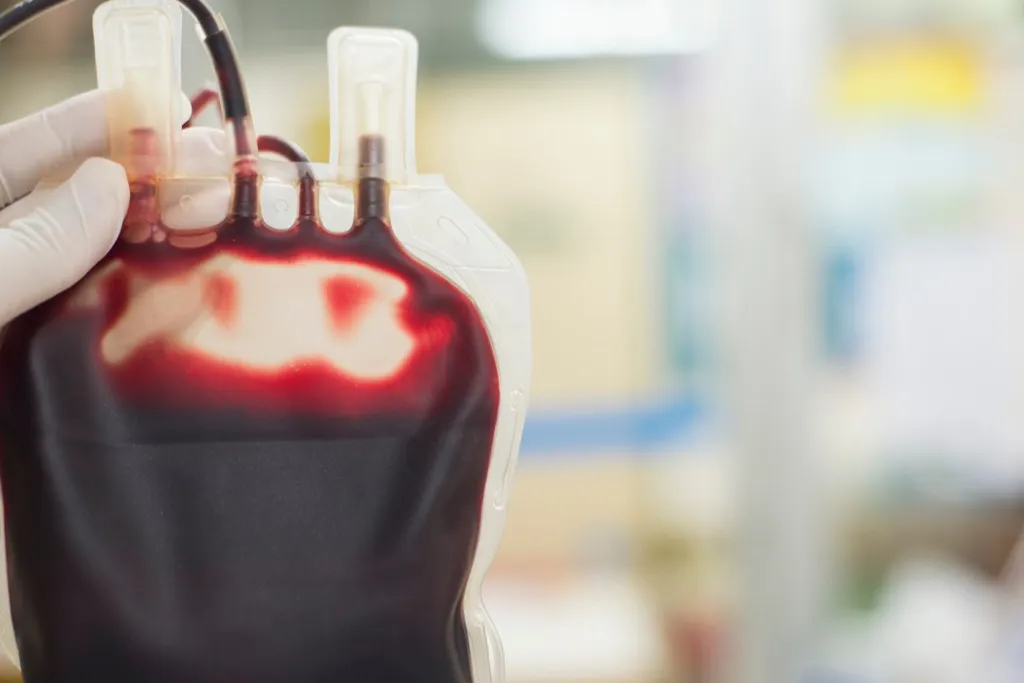
Or, at least, the components of one. Iron is an important nutrient that the human body needs. It helps your red blood cells carry oxygen, which is necessary for producing energy throughout the body. That’s why an iron deficiency can present itself with feelings of exhaustion. Amazingly, a healthy adult has about three grams of iron, enough that, if it were pulled out and melted down, it could form a nail up to three inches long.
64
Redheads aren’t actually going extinct.

Periodically, a rumor starts on the internet that says natural redheads will become extinct by the year 2060. Lucky for gingers everywhere, this is a myth. It’s true that the gene that causes red hair is recessive, meaning that both parents must have it for their child to have red hair. However, even non-redheads can carry the red hair gene, and it can pop up unexpectedly in generations down the line.
65
Pro baseball once had women players.

While there are currently no female players in Major League Baseball, there have been plenty of women in professional men’s leagues. The first was Lizzy Arlington, who pitched during the ninth inning for the Reading Coal Heavers in 1898 and won her team the game. A little over 30 years later, an African-American woman, Jackie Mitchell, pitched against the Yankees during an exhibition game, striking out both Babe Ruth and Lou Gehrig. What’s more impressive: Mitchell was 17 years old at the time.
66
Koalas have fingerprints.

Chimpanzees and gorillas have human-like fingerprints and so do koalas. In fact, koala prints are very similar to human fingerprints, even to expert crime scene investigators. As of yet, no koalas have framed humans for their crimes, but now we know it’s not impossible…
67
Humans are just one of the estimated 8.7 million species on Earth.

Human beings may dominate the planet with our sprawling cities and far-reaching technology, but we are, in fact, just one species among some 8.7 million that live together on planet Earth. One 2011 study published in the journal PLoS Biology estimated that “the various forms of life on the planet included 7.8 million species of animals, 298,000 species of plants, 611,000 species of mushrooms, mold and other fungi, 36,400 species of protozoa, and 27,500 species of algae or chromists.” And it’s worth noting that the researchers did not venture to put an estimate on the number of bacteria.
68
Riding a roller coaster could help you pass a kidney stone.

After multiple people reported they had passed a kidney stone while riding Walt Disney World’s Big Thunder Mountain Railroad ride, a research team from Michigan State University decided to investigate the phenomena in 2016. They conducted tests with a model kidney and found that there was a 64 percent kidney stone pass rate for those seated in the rear of the Thunder Mountain ride. That number was just 16 percent for those seated in the front.
69
Dinosaurs lived on every continent.
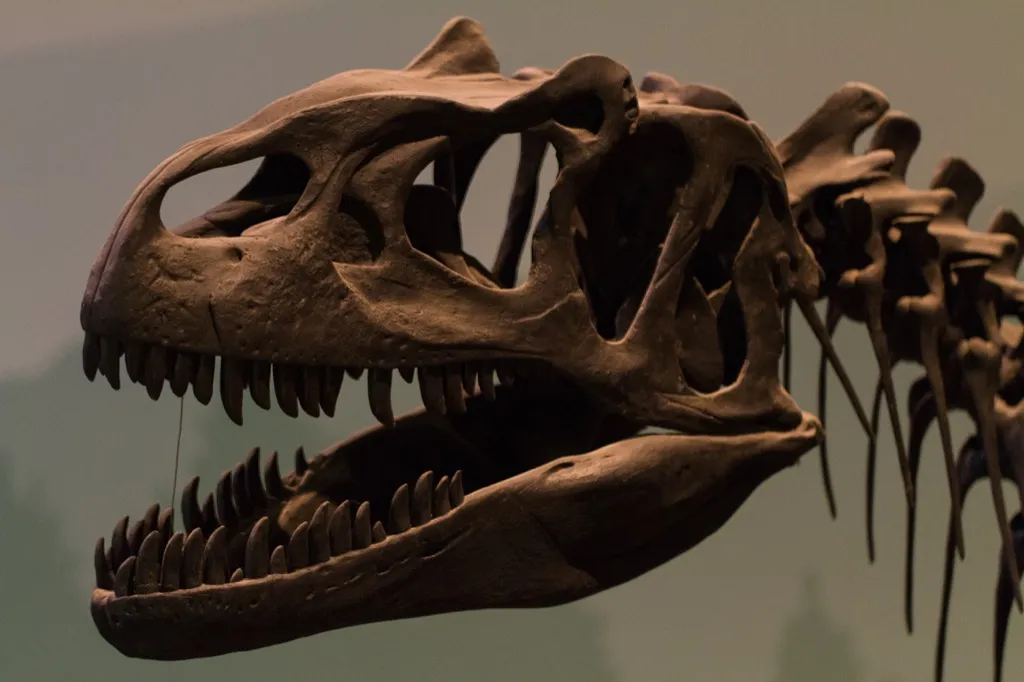
Back in their day, dinosaurs lived on every continent on Earth, including Antarctica. The reason we only find their bones in certain places, though, is that weather and soil conditions in those places were just right for the bones to be fossilized. Scientists also speculate that there may be many smaller-sized dinosaurs that we know nothing about because their bones were too small to fossilize well.
70
Bee hummingbirds are so small they get mistaken for insects.

Hummingbirds are known for being itty-bitty creatures, but Bee Hummingbirds are the teeniest versions of these shockingly tiny flyers. They’re actually the smallest bird in the world. They are so minuscule that they are sometimes mistaken for insects (which explains their name), according to the National Audobon Society. The birds are just two and a quarter inches long and weigh less than a dime.
71
Sea lions can dance to a beat.
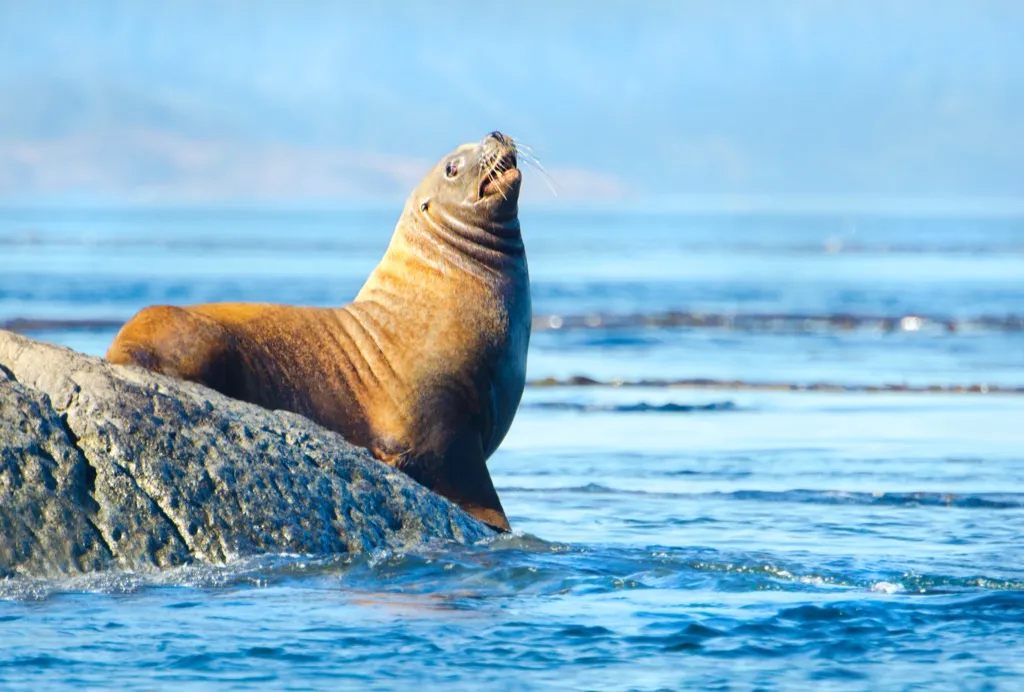
There are only two mammals on Earth with the proven ability to move their bodies in time with an external beat: humans (though not all humans, to be fair) and sea lions. When researchers at the University of Santa Cruz rescued a stranded sea lion in 2013, they found that she was very smart, and she was even able to learn how to dance. Though parrots can also keep a rhythm, it was previously thought that only animals capable of complex vocal learning could do this.
72
Rolls-Royce makes the most expensive car in the world.

Currently, the most expensive car in the world is a Rolls-Royce Sweptail that sold for $13 million. However, even if you have that kind of dough lying around, you won’t be able to buy it—only one was made, and it was custom-built from the ground up according to the buyer’s specifications. But brand-new custom cars have nothing on used classics; the recent sale of a 1963 Ferrari GTO for $70 million is supposedly the highest price ever paid for a car.
73
The famed “Typhoid Mary” infected more than 50 people by cooking for them.

“Typhoid Mary” was a real historical person who became notorious in the early 1900s. She was an Irish woman named Mary Mallon who immigrated to the United States in the 1880s. Though she had no symptoms of typhoid fever, she carried the bacteria in her blood and could pass it on to other people. Because no doctor could convince her that this was true and she didn’t feel sick, she insisted on working as a cook. During her career, she infected at least 51 people, three of whom died, before she was isolated in enforced quarantine for the last decades of her life.
74
The legend of the Loch Ness Monster goes back nearly 1,500 years.

There’s a tale written in the year 565 A.D. that speaks of an Irish monk traveling through Scotland. While there, Saint Columba heard stories of a “water beast” that attacked and killed the local people when they went in the river. Wanting to help, the monk used his friend as bait to lure the beast into sight, at which point Columba commanded it to “go no further,” and the creature stopped and swam back upstream. That river is now known in Scotland as the River Ness, which flows out from the famous Loch Ness.
75
Nutmeg can be fatally poisonous.

A little dash of nutmeg in a pumpkin pie or on your egg nog can give it some extra flavor and a lovely, spicy scent. Too much nutmeg, however, can be toxic. Two to three teaspoons of raw nutmeg can induce hallucinations, convulsions, pain, nausea, and paranoia that can last for several days. Actual fatalities are rare, but they have happened.
76
Chinese police use geese squads.

You’ve heard of police dogs, but police geese? As of 2013, 12 police stations in a rural area of China have begun to use geese as sentries. They are alert animals and, as you probably know, can create a lot of noise and commotion, which creative Chinese law enforcement officers are taking advantage of. While this trend has yet to spread throughout China, Dongwan police claim that the geese have already stopped at least one theft.
77
The first iPhone wasn’t made by Apple.

The first mobile device to be called an “iPhone” was made by Cisco, not Apple. It allowed the user to use the voice functions of Skype without a computer. Apple announced its own product just 22 days later, and Cisco sued for trademark infringement. The lawsuit was ultimately settled out of court and both companies were allowed to keep using the name. However, you’ve probably never heard of the Cisco iPhone.
78
There’s a country where twins are most likely to be born.

Benin, a country in central Africa, is notable for having the highest birth rate of twins in the world. While the world average is just 13 twins per 1,000 births, Benin more than doubles that rate, at nearly 30 twins per 1,000 births. There’s no single factor that causes this, but genetics, diet, and even the mother’s height are thought to play a role.
79
The Comic Sans font came from an actual comic book.

Most adults nowadays who know anything about graphic design steer away from using the Comic Sans font in formal documents. The font was designed by Vincent Connare, who drew direct inspiration from his favorite comic books, including Alan Moore and Dave Gibbons‘ celebrated Watchmen series.
80
For 100 years, maps have shown an island that doesn’t exist.

Almost nothing is known about Sandy Island, a land mass about the size of Manhattan in the Pacific Ocean off the coast of Australia. Supposedly, explorer James Cook discovered it in 1774, and it began appearing on nautical maps in 1908. It wasn’t until 2012, when a team of Australian scientists set out to survey the island, that they discovered there was no island there at all. The scientists guessed that Cook may have in fact spotted a “pumice raft” of floating volcanic stone and gas. The Sydney Morning Herald even published an obituary for Sandy Island.
81
Babies are physical anomalies.

Babies, particularly newborns, are surprisingly different from the children they’ll grow up to be. When they’re born, their heads account for a quarter of their full body weight, and the size of their brains will double in the first year of life. Babies have 300 bones and around 10,000 tastebuds all over their mouth. Some of the bones will fuse as they age (into 206, as an adult), but the tastebuds not on the tongue will eventually vanish.
82
The Queen has some hidden hideaways.

Since the early 13th century, the city of London has officially paid rent to the Crown for two small pieces of property. Fortunately for the city, the price has stayed the same for more than 800 years: one knife, one ax, six horseshoes, and 61 nails, presented every autumn in the Ceremony of Quit Rents. Although one of these properties is located in the Moors in Shropshire and the other is near the Royal Courts of Justice in the city itself, no one knows the exact location of the Queen’s land.
83
The man who wrote Dracula never visited Transylvania.

Bram Stoker was an Irish author who is now best remembered for his gothic horror novel Dracula. Partially set in Transylvania, a mountainous region in central Romania, the story cemented the legend of the vampire in mainstream European and American culture. Despite Stoker’s many world travels, he never visited Eastern Europe—and, by virtue, Transylvania—at all.
84
The Australian government banned the word “mate” for a day.

There are probably slang or informal words that get on your nerves from time to time, particularly when you think something should be taken seriously. In 2005, Australian Parliament took a few citizen complaints a little too seriously and banned anyone on their staff from using the word “mate” while at work. Fortunately, Prime Minister John Howard objected, claiming that “mate” was an important part of Australian culture, and the ban was overturned within 24 hours.
85
Many languages have the same roots.

English, Portuguese, Latvian, Pashto, and Greek all sound very different today, but these languages all have a common ancestor called Proto-Indo-European. Though we don’t have any written examples of it, linguists have worked backwards from a variety of modern languages to try to reconstruct it. Using their reconstruction, the sentence “The king wanted a son” would be written as “H3rḗḱs súhxnum u̯l̥nh1to.”
86
A tick bite can make you allergic to red meat.
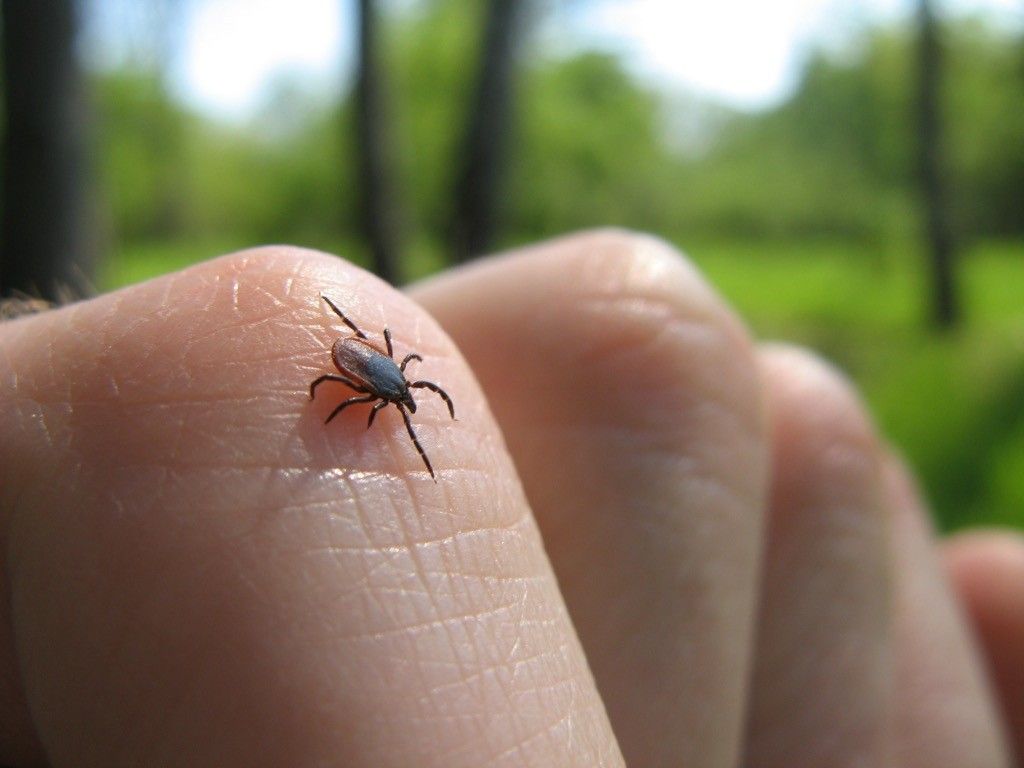
Plenty of people have food allergies, but few are the result of an insect bite. In a strange and growing trend, some people who get bitten by the Lone Star tick can develop a sudden allergy to red meat. Beef, lamb, and pork (which are technically classified as red meat) can make people with this allergy experience headaches, sneezing, a runny nose, and nausea. In severe cases, it can cause the person to be unable to breathe. For some sufferers, the allergy fades over time, but for others, it’s permanent.
87
Harriet Tubman was even more heroic than you thought.
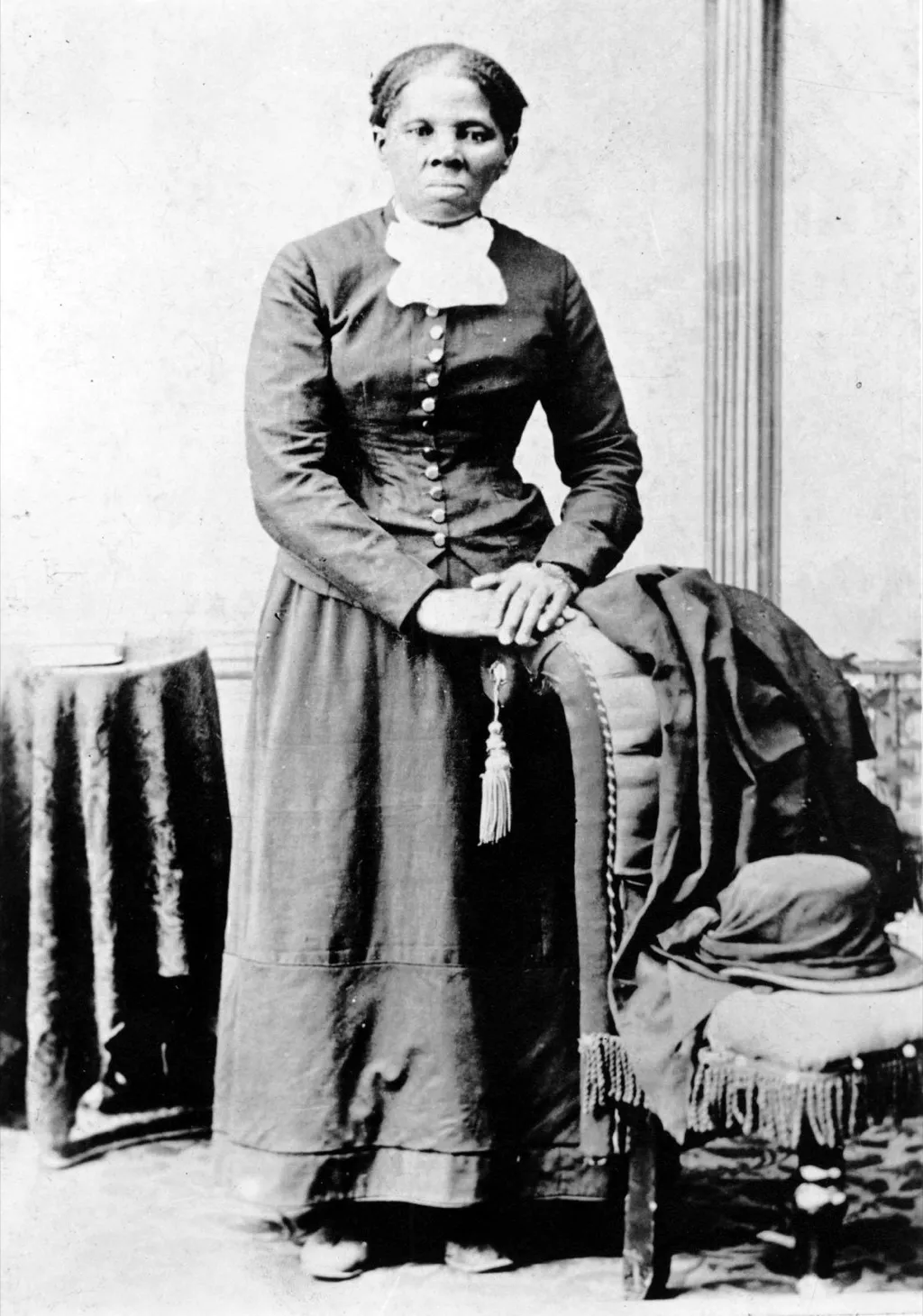
You probably know that Harriet Tubman was a former slave who became a political activist for the abolition movement. But in addition to smuggling escaped slaves through the Underground Railroad, during the Civil War she was the first woman to lead an armed assault. She planned and executed a number of raids and was known to carry a revolver for personal protection.
88
Tornadoes can cause “fish rain.”

Tornadoes can develop over water just as well as they can over land. When they do, they’re called “waterspouts,” and they suck up large amounts of lake or sea water—as well as whatever’s swimming in that water. If the waterspout travels on to the land and the winds decrease, there’s nowhere for those fish to go but down. As far as we know, there’s no tornado powerful enough to pick up sharks, but a fish-nado is entirely possible.
89
Napoleon was once attacked by thousands of rabbits.

Napoleon Bonaparte was once one of the most powerful men in Europe, but he suffered an ignominious defeat at the hands (or paws) of rabbits. After a military victory, Napoleon’s chief of staff organized a rabbit hunt to celebrate. Thousands of rabbits were brought in to be set loose, but instead of hopping away when the cages were opened, they turned to attack, swarming the partygoers. After trying and failing to shoo them away, the great Emperor Napoleon ran for the safety of his carriage.
90
Star Trek‘s Scotty stormed the beach at Normandy.

Canadian actor James Doohan, best known for playing Montgomery “Scotty” Scott on the original Star Trek series, served in World War II with the 3rd Canadian Infantry Division. As a commissioned lieutenant, he led his troop up a mine-strewn Juno Beach as part of the Allied Forces’ D-Day invasion. Later in the day, he was wounded by friendly fire that caused the amputation of the middle finger on his right hand. You might not have noticed it because, during his time on Star Trek, directors did the best they could to avoid showing the injury on screen.
91
Apple Pie isn’t actually American.

Apples originally come from Asia. The first pies were baked in Medieval Europe. Even the concept of putting apples in pie traces back to a recipe from England in 1381. Nevertheless, the phrase “as American as apple pie” turned up by 1924 and became a common saying during the years of the Second World War.
92
Pigs are constitutionally protected in Florida.
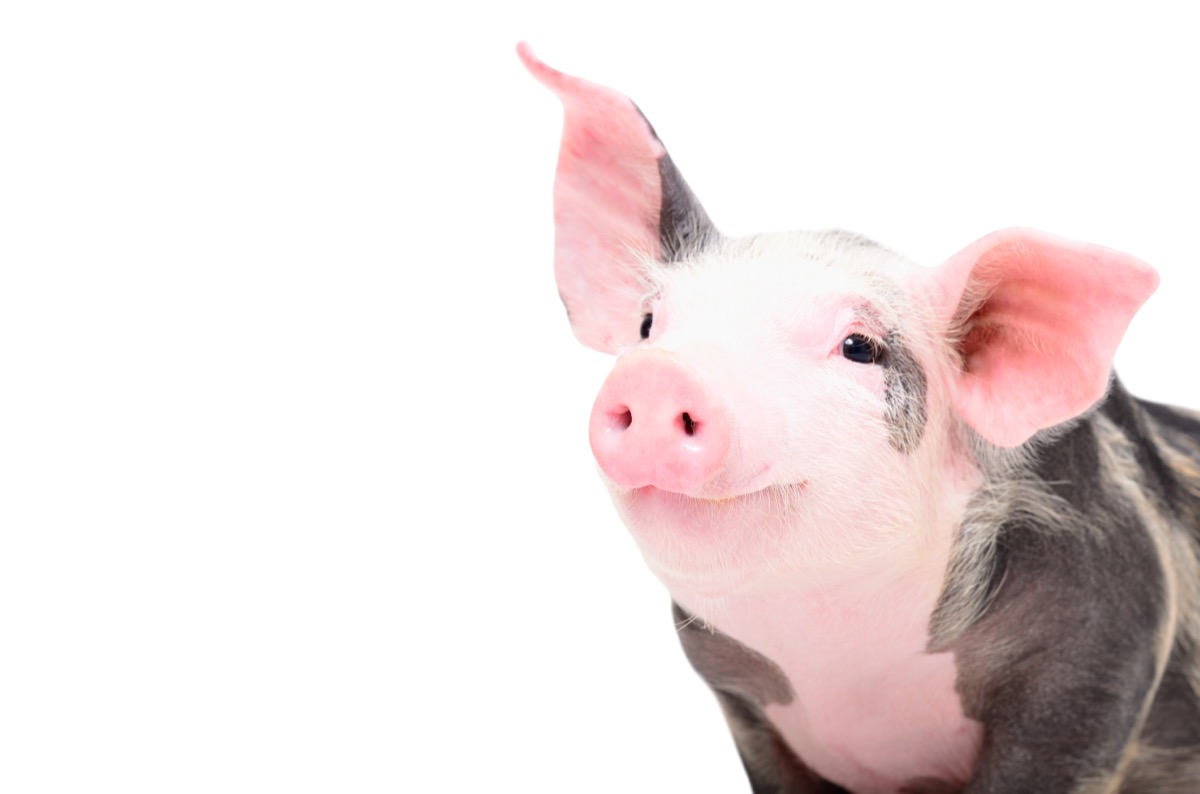
First written in 1838, the Constitution of the state of Florida guarantees the right to privacy, the freedom of speech, and the right of pregnant pigs to be free from cages. Unlike many crazy or outdated laws, this amendment is recent (passed in 2002) and comes from a well-meaning place: the prevention of cruelty to animals. During pregnancy, a pig must not be caged or even tethered such that it can’t turn around freely.
93
Mr. Cherry breaks all the records you’ve never heard of.

Japan’s record breaker for most records broken is Cherry Yoshitake, a children’s entertainer who goes by “Mr. Cherry.” In 2018 alone, Mr. Cherry set one-minute records for the most pairs of underwear pulled on (36), the most baked beans eaten (71), and the most apples bobbed (37).
94
Sweat doesn’t actually stink.

You might notice that any sweat you produce right after a shower doesn’t smell so bad. That’s because your sweat itself isn’t stinky; it’s the bacteria on your skin that breaks the sweat down that causes the odor. Additionally, you’ll find that the sweat on your arms and legs doesn’t smell as much as your armpits. That’s because sweat glands in your armpits secrete more protein into a dark, damp environment—the perfect place and food for bacteria.
95
Some planets produce diamond rain.

Saturn and Jupiter are gas giant planets that produce a truly unique form of weather. Recently, scientists discovered that there is plenty of carbon in these atmospheres. When carbon soot gets hit by lightning, it hardens into graphite and falls downward, where the pressure of the atmosphere hardens it further, until it becomes… a diamond! Storms on these planets may literally rain diamonds as big as a centimeter across.
96
Sharks can live for five centuries.
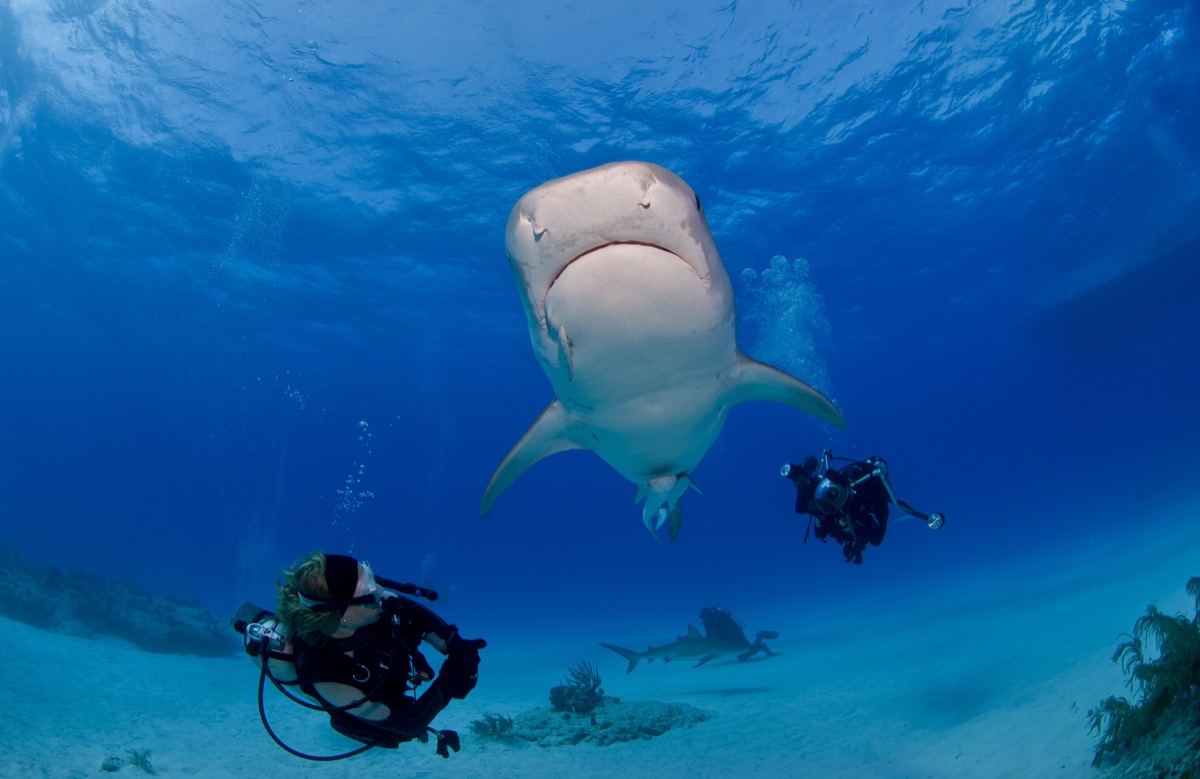
Greenland Sharks are known to be some of the oldest living animals in our world. Researchers did carbon dating on a Greenland Shark that was caught in 2014 and found it to be around 392 years old. Further testing revealed that our fishy friends could be up to 500 years old. Yes, that would mean that our geriatric friends would have been alive when Leonardo Da Vinci painted the “Mona Lisa.”
97
There’s an entire town under a rock.

If you’ve ever been accused of “living under a rock,” you’ll feel right at home in Setenil de Las Bodegas in Spain. Many of this tiny town’s 3,000 residents live and work and play in a gorge beneath a huge rocky outcropping, where homes are built right into the rock. It provides so much shelter that historians think this area has been occupied by human settlements since the Stone Age.
98
It is illegal to sell a “bounceless” pickle to somebody in Connecticut.

This law put Connecticut Librarians in quite the pickle. The law actually arose as a legend and the people demanded the truth. For hours, librarians in the state scanned past archives of laws within the state until one librarian eventually found the truth in the Hartford Courant. The law was in fact an ordinance that was created in 1945 to thwart pickle packers Moses Dexler and Sidney Sparer. These two men were selling inedible pickles, so laboratories conducted experiments and found that if it doesn’t bounce, don’t eat an ounce!
99
The Bermuda Triangle isn’t any more likely to cause a mysterious disappearance than anywhere else.

This area in the North Atlantic Sea is also called “The Devil’s Triangle” because it is an area of the ocean that stretches between the tip of Florida, Bermuda, and Puerto Rico. It has been thought to seemingly swallow up ships and aircrafts. Explorers as far back as Christopher Columbus have reported odd occurrences, like fireballs in the sky (that turned out to be a meteor crashing).
But historians, scientists, and the U.S. Coast Guard have proven that vessels are no more likely to disappear in the Bermuda Triangle than they are anywhere else in the ocean. Many prior disappearances have been demystified as remains of numerous wrecks were discovered or explained by weather patterns in the area at that time.
100
There’s a world record—and a happy ending—for the greatest distance thrown in a car accident.

This is one world record you may not want to try and top. A car traveling 70 miles per hour struck Matthew McKnight, an off-duty paramedic, when he stopped to help out with an accident on the side of an interstate in 2001. He was thrown 118 feet, almost half a football field.
Eric Brader, his emergency room physician, told McKnight he should send it into the Guinness Book of World Records, but McKnight brushed it off as a joke. Brader was so impressed by the feat that he sent in the paperwork anyways, which was approved in 2003, but didn’t make the cut until its 2008 edition.
101
You can sneeze faster than a cheetah can run.

Clocking in at 100 mph, we can sneeze faster than cheetahs run, four-and-a-half times faster than Usain Bolt‘s record, and 20 times faster than Michael Phelps. (Unfortunately, we also expel about 100,000 germs when we sneeze.)
102
The fire hydrant patent was lost in a fire.

The fire hydrant patent is credited to Frederick Graff Sr., who was the chief engineer for Philadelphia Water Works during the early 1800s. Unfortunately for Graff Sr., the patent was destroyed when the patent office in Washington, D.C., burned down in 1836. After 100 years, retired firefighter George Sigelakis reinvented the hydrant after they had been failing to work in too many critical emergencies.
103
Saudi Arabia imports camels from Australia.

Saudi Arabia is known for its vast expanse of desert, so it may seem unbelievable that they rely on Australia to supply them with animals that dominate their landscape.
Australia originally had camels imported to be used for transporting heavy loads or for riding. They were let loose when their work was done, causing an unwanted spike in their population. Australians then sold the camels back to desert-based countries like Saudi Arabia, which use camels at a much higher volume.
104
One man once survived two atomic bombs.

Tsutomu Yamaguchi survived both nuclear attacks to Japan when the U.S. dropped atomic bombs during World War II. Yamaguchi, sent to Hiroshima on business on August 6th, 1945, saw the U.S. drop the first atomic bomb. Miraculously, he survived with burns across his face and arms, but made it home to Nagasaki. Three days later, the second atomic bomb hit, flattening Yamaguchi’s home. Because his family was out finding ointments to treat his already existent burns, they were safe in a tunnel and miraculously survived as well.
105
The cast of Friends still earns around $20 million each year.

When the show came to an end, the cast of the popular TV show Friends negotiated syndication rights for themselves. That means they receive a percentage of the revenue (two percent) from reruns airing across all broadcasting companies. Since the much-loved TV show still pulls in around $1 billion of revenue, Courteney Cox, David Schwimmer, Jennifer Aniston, Lisa Kudrow, Matt LeBlanc, and Matthew Perry all make major dough each year for doing, well, nothing—$20 million is the estimate.
106
Pluto technically isn’t even a year old.

Pluto was discovered on February 18th, 1930. It is the farthest (dwarf) planet from the Sun, requiring it to go a much farther distance than we are used to on Earth. It takes 248 Earth-years for Pluto to complete one rotation of its own around the sun. This places Pluto’s first birthday since its discovery on Monday, March 23, 2178.
107
Cows kill more Americans each year than sharks do.

While sharks account for about 53 bites per year, only one of those ends up being fatal. Cows, on the other hand (or hoof), kill around 20 people per year.
108
Newborns don’t have kneecaps.

This belief is only a half truth, as babies actually technically do have kneecaps when they are born. Those knees just aren’t hardened yet, and remain soft cartilage throughout their childhood until they eventually turn into bone.
109
In Germany, people help toads cross the road.

You might not want to bring up the popular video game Frogger in Germany. There, they like to protect their frogs, toads, and other amphibians. In order to save them from harm when crossing the street, conservation organizations installed more than 800 fences along popular roadways. Along these fences are buckets, so when they try to cross, they eventually hop into one. At the end of the day, wildlife conservationists collect the buckets and release frogs across the road into a nearby forest with ponds and lakes.
110
Cheetahs don’t roar.

Cheetahs can’t roar, but they can purr, meow, hiss, bark, and growl instead. This type of behavior is much like the domestic cats we keep in our homes.
111
France has a dozen time zones.

The country with the widest stretch of land, Russia, spans 11 different time zones. France, though, technically has the most, clocking in at 12—but that’s due to the fact that its territories are dispersed in various parts of the world. The U.S. ties with Russia in second, but not all time zones are inhabited.
So, Russia is the only place in the world where one citizen could be waking up at 8:00 a.m. and another could be going to bed at 11:00 p.m.
112
Humans aren’t the only species to adopt.

We’ve seen the heartwarming videos of dogs nursing baby squirrels back to health—and that’s actually much more common than we think. It becomes mutually beneficial to have more furry friends in the group to take on other roles in survival—whether that be hunting, gathering, or just simply cute companionship. Though the phenomenon isn’t completely understood, it’s clear that both humans and animals have an instinct to care for others.
113
Blue Ivy Carter is the youngest person ever to appear on a Billboard chart.

In January 2012, Jay-Z released his hit “Glory,” a dedication to his firstborn child, Blue Ivy Carter. The rapper decided it would make sense to have her featured on the song, so he included a clip of her crying before the track ends. Because her dad officially credited her in the song’s title, she became the youngest person ever to have a Billboard hit—at a mere two days old.
114
The majority of Americans choose dogs over love.

Dogs have been known for the longest time as man’s best friend, but Americans are increasingly taking that to a new level. A 2017 study from Rover.com conducted over three years found that 54 percent of dog owners are willing to end a relationship if their pup doesn’t like their partner.
The study also found that 94 percent of dog owners consider their dogs to be a part of their family, and 78 percent include their pups in major family moments. Since one in four people said they bring their cuddly companions on first dates, maybe consider bringing dog treats instead of flowers next time.
115
The first Star Wars was expected to be a flop.

The original 1977 Star Wars had a budget of $8 million, which distributor 20th Century Fox was reluctant to give to director/writer George Lucas, so he accepted a lower salary in order to keep the budget. The movie went on to make $775 million around the world, and Disney picked up the entire franchise for $4 billion. For comparison, Star Wars: The Last Jedi, which was released in 2017, had a reported budget of $317 million.
116
Your liver can regrow itself in three weeks.

The Greeks had it right with Prometheus, it turns out. According to Greek mythology, the titan was punished by having an eagle eat his liver day after day. The liver would regrow at night, leaving Prometheus at the bird’s mercy.
It turns out, the regenerative properties of this story are partially true: Doctors have found that the liver can regrow in three weeks, not one day.
117
Danes once bred a pig to look like the flag.

In the early 20th century, those who resided in North Frisia under Prussian rule were not allowed to raise the Danish flag. But some crafty North Frisians took action by breeding a pig, known as the Danish Protest Pig, to be red in color, with a large white stripe around its belly—thus creating an animal version of the flag. As they technically did not break the law, and because it wouldn’t have been feasible to ban the breeding of pigs, the Danes successfully protested Prussia.
118
A 70-year-old woman once completed seven marathons in seven days, across all seven continents.

Chau Smith was always an avid runner, and, in 2017, she decided that for her 70th birthday, she would complete seven marathons in one week across all of the continents. Traveling made it challenging—for example, Smith made the race in Egypt just minutes before the start because her plane to Cairo was delayed. But despite the obstacles, she completed her goal.
119
Dogs like squeaky toys for a dark reason.

Ever wonder why your little puppy obsesses over those squeaky toys? Because dogs are descendants of wolves whose instincts include hunting smaller animals. The sound a squeaky toy makes is very similar to the sound a small animal makes when being hunted. When Ol’ Lassie hears that, she gets excited because of these killer survival skills.
120
The man who founded Atari also started Chuck E. Cheese.

In 1972, Nolan Bushnell started the gaming company Atari, which gave us the classic arcade game Pong. Bushnell sold the company just four years later and the following year, he opened Chuck E. Cheese! In fact, there is one game in Chuck E. Cheese that actually is called Ping, a knockoff of his original arcade game, which he couldn’t use since he no longer owned it.
121
One man was once constipated for nearly two months.

In 1965, 26-year-old Angus Barbieri, who weighed 456 pounds, was put on a fasting program. It wouldn’t be ethical to conduct a study like this today, but at the time, things were different, allowing Barbieri’s doctor, William Stewart, to experiment. On a strict regimen of multivitamins and minerals, Barbieri got his nutrients without eating a scrap of food, which resulted in nearly two months of constipation. By the end of the year, Barbieri was 180 pounds. (Note: Fasting to this degree is not recommended, as it can lead to serious health conditions.)
122
Most people break up on Mondays.

Searching through public Facebook data, Lee Byron and David McCandless found that relationships statuses changed for the worse two weeks before Christmas, around Easter, and on Mondays. Though this data may be somewhat misleading, as people might not be live-updating their breakups, it shows an obvious trend.
123
There may be 2,000 active serial killers in the U.S. right now.

Thomas Hargrove has been archiving homicides for years through his Murder Accountability Project. Through his experience, he came up with an algorithm that found patterns in recent unsolved murders linked to at least one other murder through DNA. This allowed him to estimate the number of unsolved cases in the U.S. at any given time. According to The New Yorker, he believes that the number of active serial killers in the U.S. is around 2,000.
124
Beethoven could still hear after going deaf.

Upon going deaf, Beethoven discovered that if he bit onto a metal pole that connected to the piano he was playing, he could hear almost perfectly well. This process is called bone conduction, and while technology has evolved, the science is the same: Vibrations are transferred from the conductive metal into our bones. When this happens, our ears pick up the signal with no sound distortion.
125
Ants have a built-in FitBit.
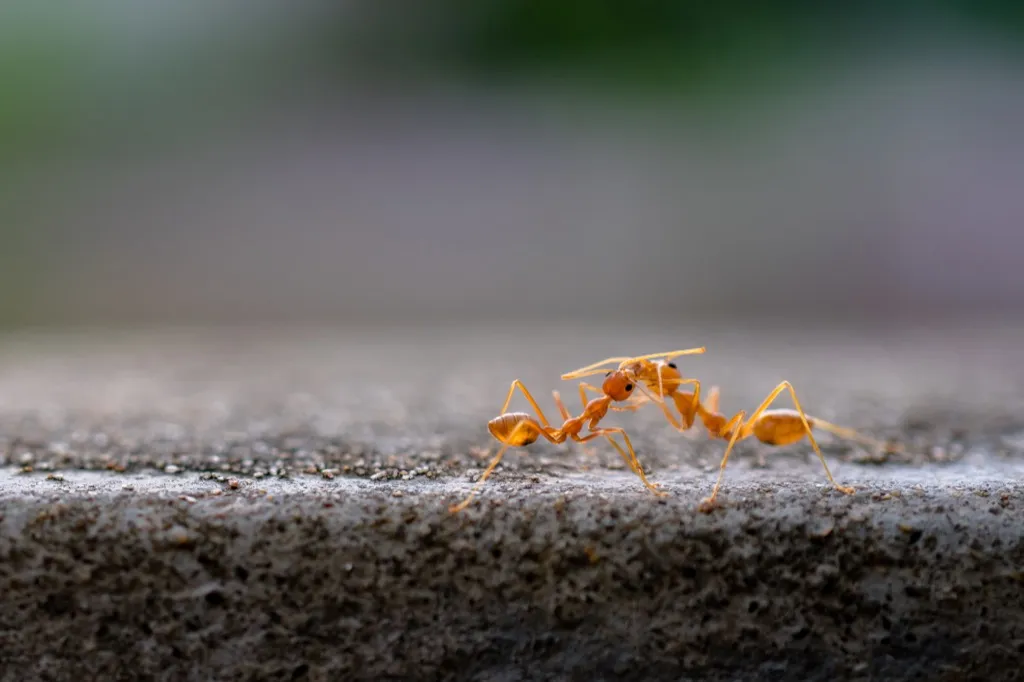
While previous research found that ants use visual cues, a 2007 study discovered that desert ants have an internal pedometer that helps them keep track of their travels and find their way back home.
126
Stressed men have altered proclivities.

A 2012 study published in the journal PLoS ONE found that men who are feeling stressed out prefer women with curvier figures. The study had one experimental group perform a stressful activity, while the other control group did not. Afterward, they were shown pictures of women with various body types. When the men in the control group were asked to rate the women on a scale of one to nine, they rated pictures of women with higher BMIs as the most attractive.
127
Crows holds grudges.
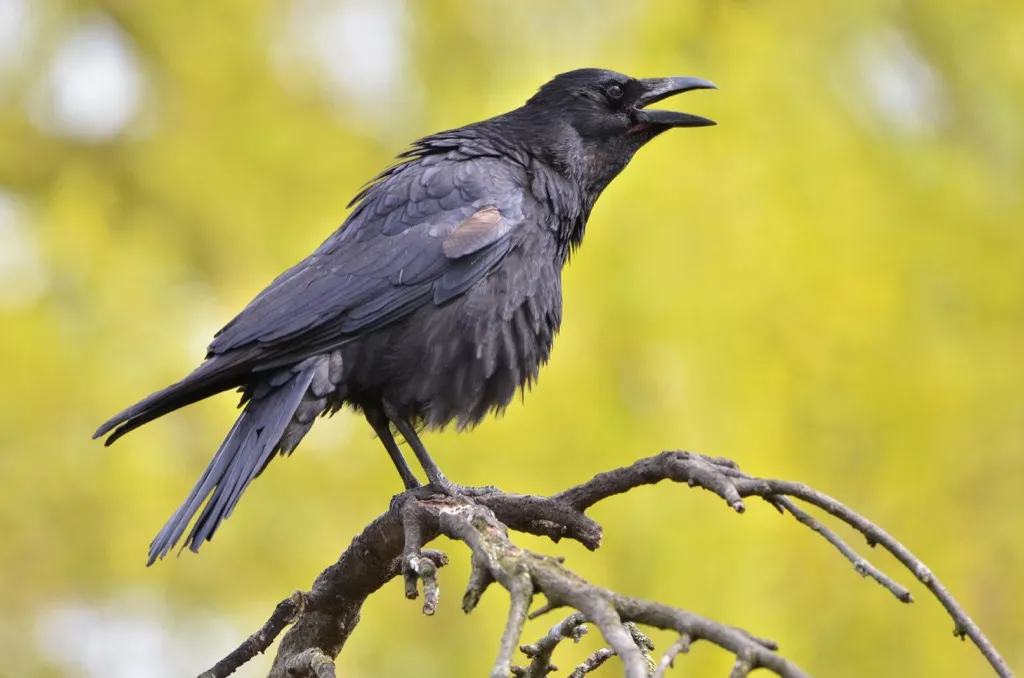
In 2010, researchers in Seattle found that formerly captured crows were able to remember the face of their abductor even years after the incident. Once they identified the suspect in question, they would threaten them by diving down and swarming the person that they had felt threatened by years before.
128
Canada once heavily targeted LGBTQ individuals.

Our Canadian neighbors may not have been as friendly as we thought. During the Cold War era, Canada spent thousands on its historic “Fruit Machine.” This device was supposedly able to identify gay men and lesbian women by monitoring subjects as they were shown pornographic images with homosexual content.
This, unfortunately, led to the wrongful persecution of many of Canada’s fine citizens. In 2017, Prime Minister Justin Trudeau apologized for the mistreatment of these people.
129
Bill Gates has donated nearly half his fortune.

Microsoft founder Bill Gates encourages the Giving Pledge, a notion that, if you are fortunate enough, you should be giving 50 percent of your wealth to those who need it most. As of 2013, he has donated $28 billion and has saved around 6 million lives by bringing vaccines and better healthcare to people worldwide.
130
You can always “see” your nose.

The human brain is capable of amazing things, but in order to do those things, it needs to block out distractions through a process called unconscious selective attention. The nose is one of those distractions. In his landmark 1960s study, Ulric Neisser discovered this phenomenon after he asked participants to count the number of times basketball players passed a ball in a video. What the large majority failed to notice in the video was a girl walking through the middle of the court with an umbrella, because they were so focused on counting.
131
A restaurant in New York employs grandmas as chefs.

It is true that everybody thinks their Italian grandma—or nonna—is best cook around. So it was a genius idea when Joe Scaravella decided to gather up as many nonnas as he could to work in his restaurant in Staten Island. Enoteca Maria combines the skill of these delightful, talented grandmothers and has them create and cook recipes from their own family cookbooks.
132
Shaq only ever made one three-pointer.

Shaquille O’Neal made the only three-point shot he would ever make in his entire career on Feb. 16, 1996. When the Orlando Magic played the Milwaukee Bucks, O’Neal received an almost full-court pass before he shot the three-pointer. Despite being the only official three-point shot in his career, he went down in NBA history as one of the greatest of all time.
133
America’s first bank robber deposited the money back into the same bank.

At the Bank of Philadelphia on Aug. 1, 1798, a sum of $162,821 was stolen from the vault. There was no sign of forced entry so it was thought to be an inside job. Patrick Lyon was imprisoned as the prime suspect, as he had been the carpenter that worked on the vault doors.
But then, they realized a man named Isaac Davis had been depositing large sums of money into the Bank of Philadelphia. It turned out, he was one of the robbers involved. In 1799, Lyon was freed, and Davis only ended up repaying the money without serving a day in jail.
134
Germany uncovers 2,000 tons of unexploded bombs every year.

During World War II, the Allied forces dropped over a total of 2.7 million tons of bombs on Germany. Due to certain defects in their delay timers, a large number of bombs never exploded—around 10 percent, or 200,000 tons. As they’ve been discovered in years since, it’s routine for German citizens to be evacuated from buildings or sectioned off on streets, while bomb experts handle the devices.
135
Sharks existed before trees.
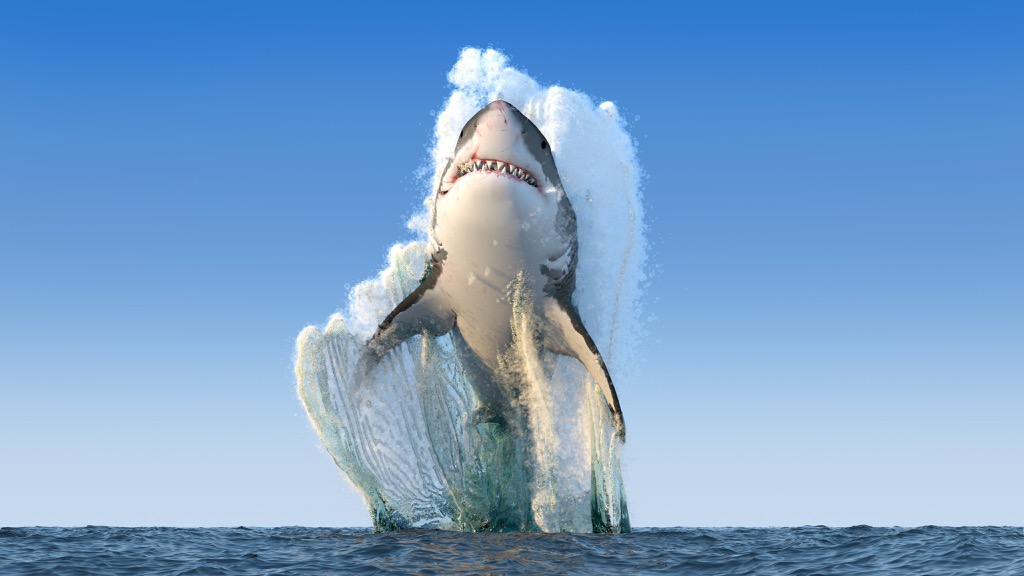
Trees are young’ns compared to the geezer sharks that rule the sea. Sharks have existed for around 400 million years, while trees became their own official species only 350 million years ago. Other notable animals that outlive our leafy ancestors are the horseshoe crab as well as the jellyfish.
136
And trees weren’t always biodegradable.

Today, bacteria and fungi eat away at fallen trees, but that wasn’t always the case. Bacteria had to evolve to eat wood, so hundreds of millions of years go, trees would fall at death, leaving large piles of dead wood. Forest fires of unimaginable proportions would burn the massive mounds of dead wood. And that’s where most of the coal today on Earth came from, according to National Geographic.
137
Detroit undercover cops in a drug ring once fought another group of undercover cops.

“Put your hands up!” … “No, you put your hands up!” That’s likely what went down in November 2017 when two groups of undercover cops in Detroit accidentally mistook each other for the drug dealers and buyers they were respectively trying to bust. What ensued during the raid was a stand-off, resulting in fists being thrown while guns were pointed at each other. Internal affairs had to be contacted to put the officers under investigation in an attempt to figure out the unfortunate miscommunication.
138
You’re pronouncing Dr. Seuss’ name wrong.

Dr. Seuss, the popular children’s book author who is known for his rhyming skills, was born with the name Theodor Seuss Geisel. Seuss is his mother’s maiden name, and their family pronounces it as “soice” (rhyming with voice). Seuss’ college friend Alexander Liang even wrote a poem about the common misconception.
139
Nearly all species to have ever existed on Earth are extinct.
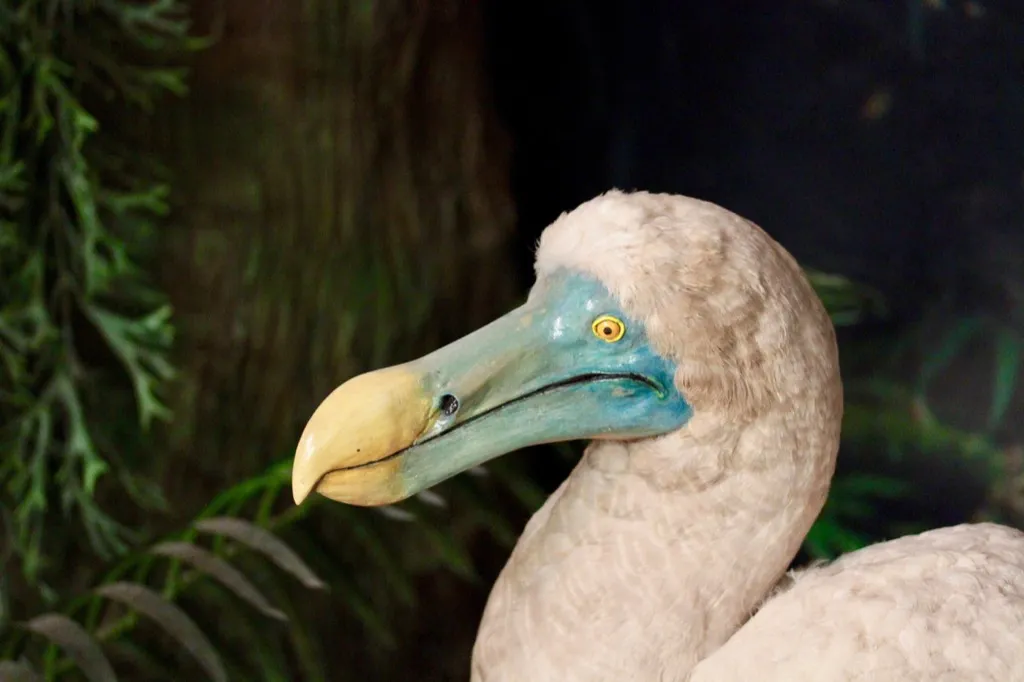
We walk an Earth that has seen the extinction of 99.9 percent of all of the species who’ve ever lived on it, according to PBS. Congratulations—that means you are technically in the .1 percent… at least for now!
140
The Silverback gorilla can lift almost a literal ton.
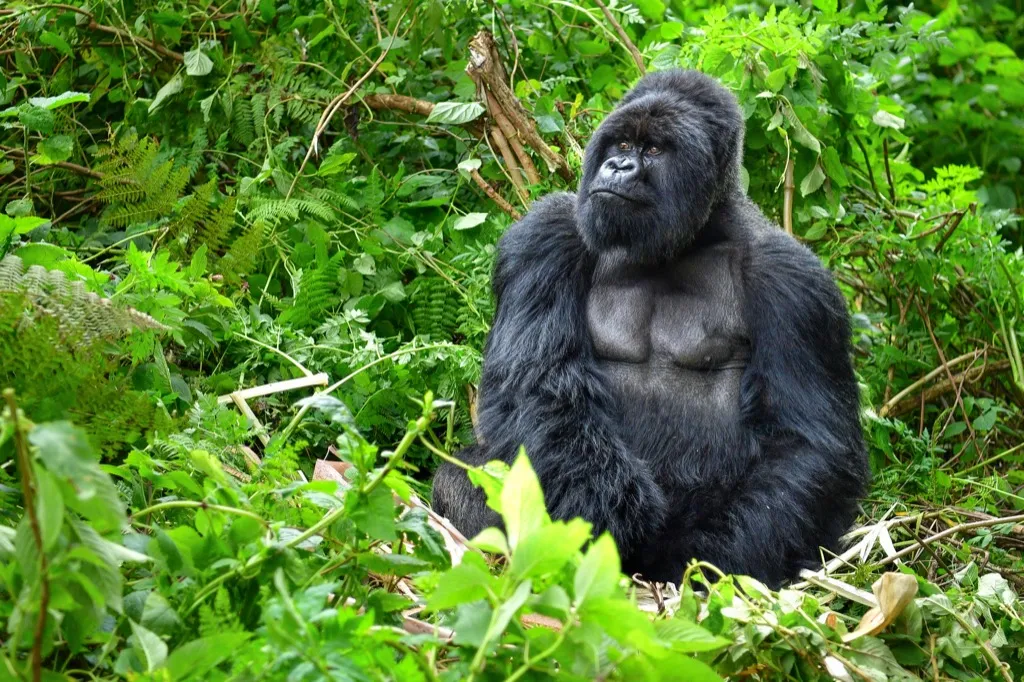
The Silverback gorilla can lift up to 10 times its body weight on average: a total of about 1,800 pounds, according to the Guinness Book of World Records. This makes them one of the strongest living animal species on Earth. Though they are feared, the Silverback gorillas will only use their strength when they feel threatened.
141
Every time you shuffle a deck of cards, you get a combination that’s never existed.

Your angsty teenage dreams of being the most original, unique person alive could actually come true! Grab a deck of cards and shuffle. Most likely, you will have created a combination of cards that had never existed yet until that moment. Any math experts out there know that this is because the probability comes out to 52 factorial or 52! (52 x 51 x 50 … x 2 x 1). The probability that two card shuffles are exactly the same is so small, it likely will never happen.
142
There is an immortal jellyfish.
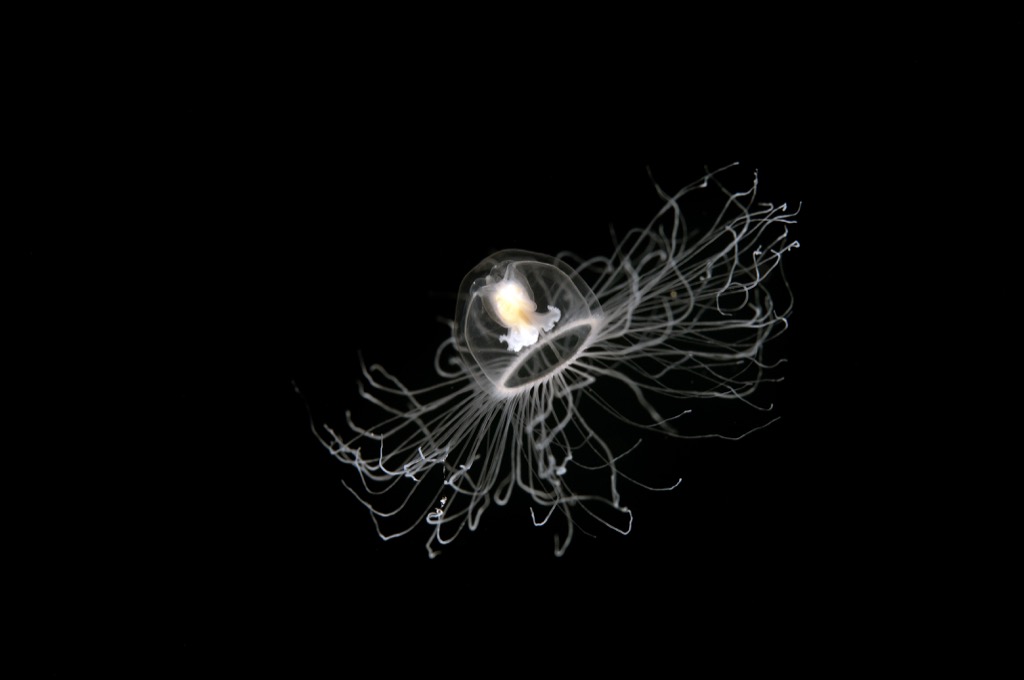
When it’s an adult, the “Immortal Jellyfish,” scientifically named Turritopsis dohrnii, can transform its cells back to its childhood state. This usually happens when it is physically harmed, sick, or even when it is starving. The jellyfish evolved this skill in order to survive throughout history, specifically when latching onto ships. Since it can hitchhike, its DNA has spread and the not-so-rare species is emerging all over the world.
143
America accidentally dropped an atom bomb on South Carolina in 1958.

In March 1958, a B-47 plane was headed to the United Kingdom and was armed with an atomic bomb. This bomb was even bigger than the “Fat Boy,” the atomic bomb dropped on Nagasaki.
During the flight, the pilots noticed a fault light, so one of them decided to check it out. In doing so, he accidentally released the emergency pin, watching in horror as the bomb dropped to the ground. The good news was, the critical part of the bomb needed to set it off was still on the plane, so it never exploded.
144
Baby blue whales grow 200 pounds per day.
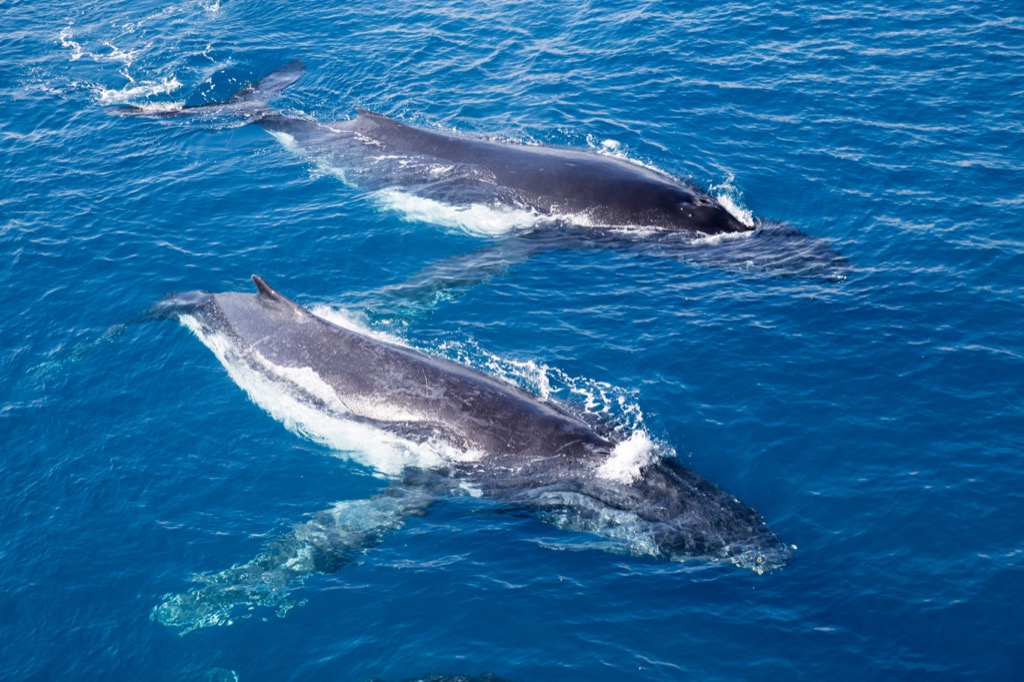
Blue Whale calves grow 200 pounds per day for the first year they are alive. They can move at a brisk pace of five miles per hour when fully grown, but can get up to 20 miles per hour if need be. They can also hear up to 1,000 miles away in the ocean.
145
Actor Bill Murray uses a 1-800 number instead of an agent or manager.

Bill Murray is famous for starring in movies like the original Ghostbusters (1984) and Groundhog Day (1993). But anyone in Hollywood who’s interested in working with him must first navigate a somewhat strange situation in order to get his attention. That’s because the star uses a mysterious 1-800 number instead of an agent or manager.
“You just call the 1-800 number,” filmmaker Theodore Melfi, who directed Murray in St. Vincent (2014), told USA Today. “You have to record the message and send the message. I started calling once a week … He never called back. I finally called his lawyer and said, ‘I’m trying [to] reach Bill.’ And he goes, ‘What number do you got?’ And I go, ‘I’ve got the 800 number.’ And he goes, ‘Well, that’s what I got.’”
146
Cats once delivered mail in Belgium.

In the 1870s, the city of Liège, Belgium, attempted to employ 37 felines as mail carriers, according to the BBC. Messages were tucked into waterproof bags that the kitties would carry around their necks. However, while one cat apparently made it to its destination in under five hours, the other felines took up to a day to complete their journeys. Due to the fact that the cats weren’t particularly reliable and definitely weren’t speedy, the service didn’t last very long.
147
It’s a myth that people are either “left-brained” or “right-brained.”

[/media-credit]
You may have been told at some point in your life that you’re either left-brained or right-brained. The story goes that “people who are left brain dominant are more quantitative, logical, and analytical, while right-brained individuals are more emotional, intuitive, and creative free spirits,” writes Psychology Today.
However, this theory isn’t true. “On the contrary, most behaviors and abilities require the right and left sides of the brain to work together to achieve a common objective,” the website explains. So while you may have certain qualities and characteristics that define you who are, they have nothing to do with which side of your brain you use more. You can thank both sides of your noggin for contributing to your unique personality.
148
Women are attracted to the scent of Good & Plenty licorice candy and cucumber.

Perfumes and colognes offer alluring aromas, but it turns out that there is another smell combination that is likely to turn a lady on. One 2005 study by the Smell and Taste Treatment Research Foundation found that the most “attractive” scent for women was Good & Plenty licorice candy combined with cucumbers. The smells of cherries and barbecue were turn-offs, but “banana nut bread also had positive effects.”
149
There’s a device that creates energy from snowfall.

It’s pretty darn impressive that scientists have been able to harness energy from the sun, wind, and water, providing us with all kinds of alternative sources of power. And now they’ve managed to create energy from snowfall. According to a 2019 study in the journal Nano Energy, engineers and chemists from the University of California, Los Angeles (UCLA) have developed a device made of silicone that can harness a charge from static electricity.
“Snow is positively charged and gives up electrons, while silicone is negatively charged and accepts the electrons,” IFL Science explains. “So, as the snow lands on the silicone, a charge is produced and then captured.” Think of it like the spark of energy you create when you rub a balloon against your hair.
150
A mermaid “documentary” once fooled so many people that the U.S. government had to issue a statement.

In 2013, Animal Planet aired Mermaids: The New Evidence, a documentary—or rather, a mockumentary—that “proved” the half-human-half-fish beings exist. And while the program was fake, plenty of the 3.6 million viewers that watched believed that the fictional claims were real. In fact, so many people were fooled that the U.S. government’s National Oceanic and Atmospheric Administration released a statement on its website addressing the confusion, saying: “Mermaids: The New Evidence is just entertainment. No evidence of aquatic humanoids has ever been found.”
151
The Iowa State Fair holds quirky competitions like a beard-growing contest and a husband-calling contest.

If you’ve ever been to the Iowa State Fair, you’ve experienced the sort of carnival-based fun that it’s been providing since 1886. And if you’ve never been to the annual event, then you should know that you’re missing out on quite a few quirky competitions, including cow-chip and rubber-chicken throwing contests, a husband-calling contest, and a beard-growing contest.
152
There’s a textbook written entirely by an AI author.

Publishers are always eager to release something unique—and Springer Nature did just that when they published a textbook by an author named Beta Writer in 2019. No, that’s not a cheeky pseudonym; it’s the name of a machine-learning algorithm designed by researchers from Goethe University in Frankfurt, Germany. The book is called Lithium-Ion Batteries: A Machine-Generated Summary of Current Research. And while it doesn’t sound like the most interesting material, it is “the first machine-generated research book,” according to the academic publishing company.
153
Earth won’t always have the same North Star.

The North Star might seem like a fixed marker in the sky. However, what we now recognize as the North Star, Polaris, hasn’t always been our guiding light—and it won’t always be in the future. By the year 13,000 A.D., the star Vega will take its place, according to NASA. And by the year 26,000, Polaris will be right back where it was and return to its status as the North Star.
154
There’s an entire family in Italy that feels almost no pain.

Members of the Marsili family handle injuries remarkably well and that’s because they only experience pain for a moment before it fades away. Letizia Marsili told Smithsonian Magazine, “I just thought of it as part of who I was. I was strong, I was resilient. I bounced back.”
However, when a researcher at the University of Siena, where Letizia works, noticed her unusual tolerance for pain—which is something her mother, sister, and son all share—the two decided to collaborate to see what was going on. They discovered that Letizia experiences “the good pain, the pain that alerts us to danger. Then it disappear[s]. The bad kind of pain, the chronic pain, the ongoing pain that we take painkillers for—she simply [doesn’t] feel that.”
155
The word “hipster” goes all the way back to the 1930s.

While “hipster” is used these days to describe someone who tries (perhaps too hard) to be stylish and trendy, the term is actually much older. According to Dictionary.com, the word was originally used (along with the similar “hepster”) in the 1930s to refer to someone in the jazz scene.
156
Guinea pigs were once sacrificed wearing earrings and necklaces and wrapped like sushi.
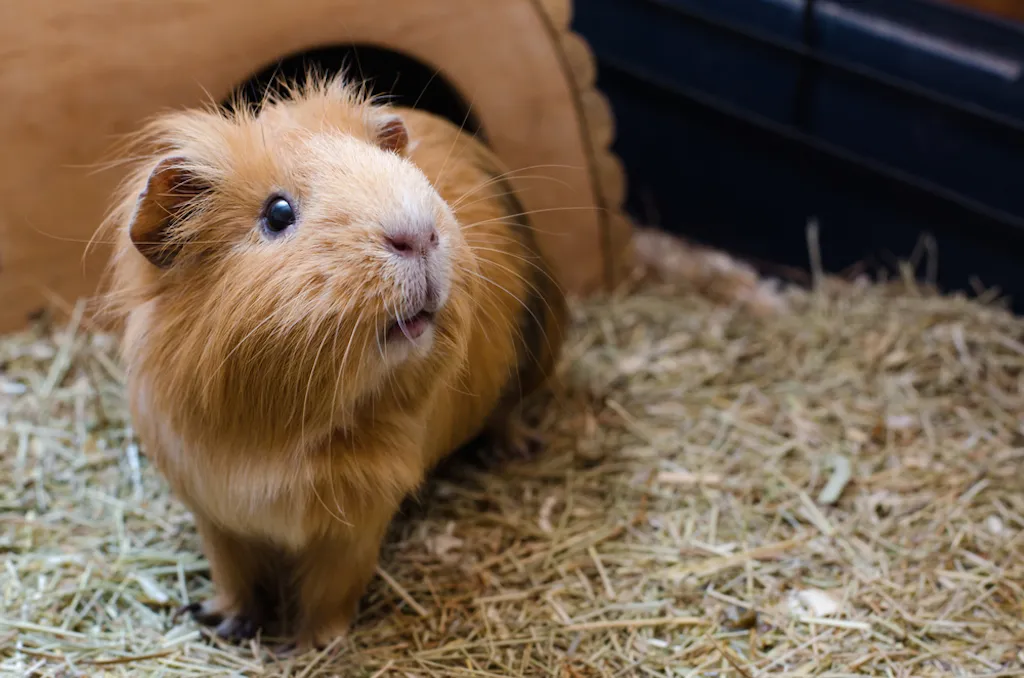
Lidio Valdez, an archaeologist from the Institute of Andean Studies, made a surprising discovery in Peru when he came across 100 dead guinea pigs that had been sacrificed by the Incan people during the 16th century. The rodents, which had clearly been a part of some sort of ritual, were adorned with earrings and necklaces made from colorful string. “Some were even wrapped in cotton rugs like a sushi roll,” wrote Gizmodo of the findings, which were published in the International Journal of Osteoarchaeology in 2019.
157
Hitler had a flatulence problem.

In 2012, Adolf Hitler‘s medical documents were being auctioned to the public by Alexander Historical Auctions. According to the files, The Telegraph reported, flatulence had become such a pervasive issue for Hitler that he had to regularly ingest 28 different drugs to keep it under control. But some of the anti-gas pills he used contained a base of strychnine, a poison that caused further stomach and liver issues.
158
Scientists were able to take a picture of an atom’s shadow.
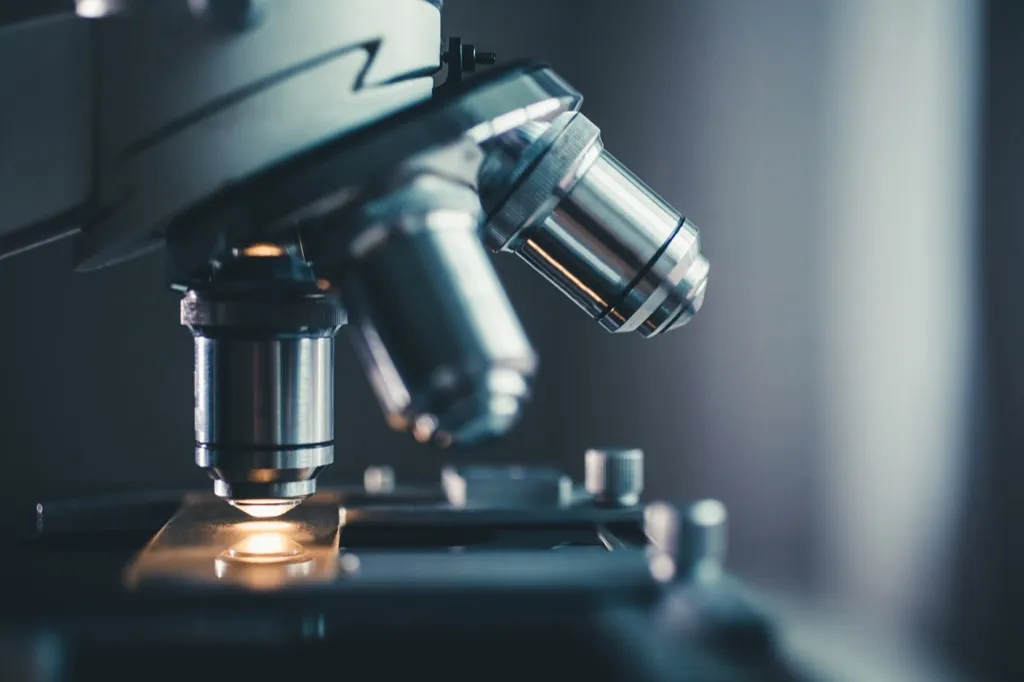
Whether you’re a professional photographer or not, you’ll probably be impressed by the photo-related feat accomplished by a team at Australia’s Griffith University in 2012. Using an electrical field to suspend a charged atom in a vacuum chamber, the team shot a laser beam at the atom and took a photo of the shadow it produced. While atoms have been photographed before, their shadows have not, making this accomplishment unprecedented.
159
Maine is the only state that borders just one other state.

If you’re in Maine, you’ll find the Atlantic Ocean to the south and Canada to the north. But if you want to stay in the U.S., you’ll have to head west to New Hampshire, because Maine is the only state in the country that borders just one other state.
160
The Twitter bird’s official name Is Larry.

If you truly want to be among the savviest social media users out there, you should know that the Twitter bird has an official name: Larry the Bird (yes, like Larry Bird, the former pro basketball player who played for Twitter co-founder Biz Stone’s home team, the Boston Celtics).
161
The longest book title contains 1,809 words.

The title of Srijan Timilsina’s 2014 Guinness World Record-setting book is practically a full text in itself. Including 1,809 words (or 11,284 characters) it begins, The historical development of the Brain i.e. from its formation from Annelida: Earthworm, Lugworm, Rag worm, Amphitrite, Freshwater worm, Marine worm, Tubifex, Leech. etc, Arthropoda: Housefly, Butterfly, Honey bee, Fairy shrimp, Horseshoe crab, Tick, Bluebottle, Froghopper, Yellow crazy ant…,” and continues to list pretty much every insect, fish, and mammal you can think of, including humans.
It then goes on to ask questions like, “What did they find and what did they eat? How did they defend from their enemies and attack them? Which is the oldest stone ever discovered? Which ancestor of human being first started to walk with the help of two limbs?” It finally ends with, “Solutions of above inquisitiveness are included in this book,” which you think would go without saying, but perhaps not if you want your title to set a world record.
162
Allergy season is getting longer and more intense each year.

If you’re one of the millions of Americans who suffer from allergies, we’ve got bad news for you: Allergy season is getting longer and more intense each year, according to a 2019 study published in The Lancet Planetary Health. Likely another unfortunate result of climate change, scientists have found that pollen counts across the Northern Hemisphere have increased over the last 20 years and that pollen season is increasing 0.9 days a year worldwide.
163
There’s a reason there’s a hole in your pen caps.

And that’s because they’re a choking hazard without them. “In addition to help prevent the pen from leaking, all of our BIC caps comply with international safety standards that attempt to minimize the risk of children accidentally inhaling pen caps. Some of these vented caps … have a little hole in the top to comply with the existing safety standards,” the BIC pen company explains on its website.
164
You can learn the High Valyrian language from Game of Thrones with an online course.

Fans of George R.R. Martin‘s best-selling books and HBO’s hit series Game of Thrones will be able to tell you that High Valyrian is the Latin-like language used in formal circumstances by the fictional nobility of Essos and Westeros. And while the stories may be make-believe, the language is a fully developed form of communication that you can learn yourself thanks to an online course from Duolingo. By the end, you’ll be able to say phrases in High Valyrian like “kirimvose” (thank you) and “avy jorrāelan” (I love you), as well as “bantis zōbrie issa se ossȳngnoti lēdys” (the night is dark and full of terrors).
165
Some Maryland residents are taxed for the rain.

As they say, “nothing is certain but death and taxes.” Depending on where in the world you live, rain may be just as much of an inevitability. And for some Maryland residents, rain and taxes are both inescapable and tied together thanks to the “rain tax,” which was passed by the state legislature and signed into law in 2012.
Nine counties, as well as the city of Baltimore, pay the annual fee that the Center for Watershed Protection describes as a “user fee charged to property owners for the service of managing the polluted runoff coming from their property.”
166
Scientists have partially revived disembodied pig brains.
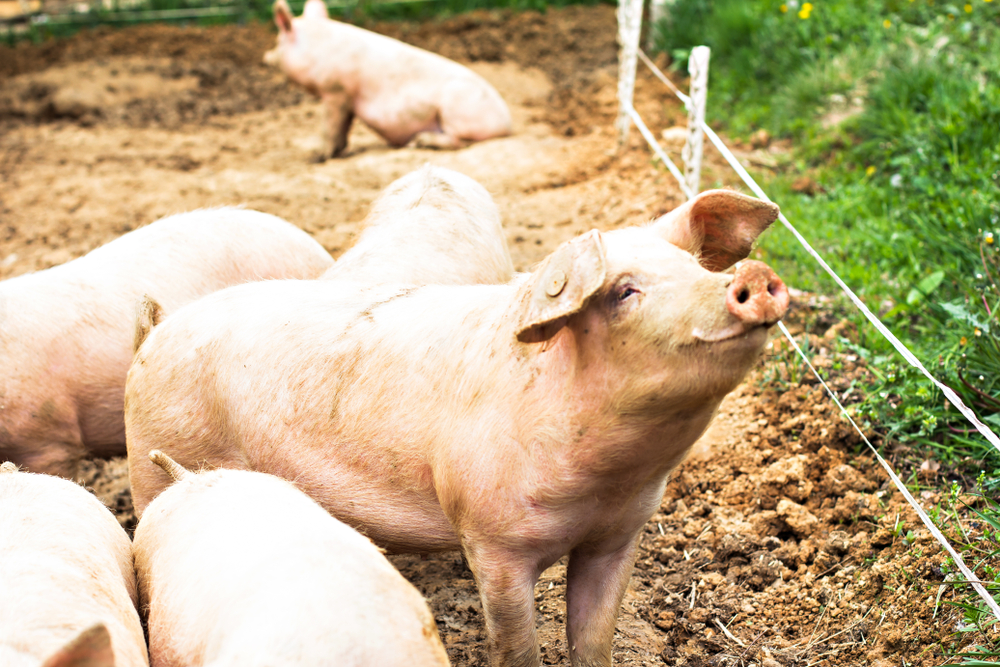
In April 2019, a team at Yale was able to restore partial functionality to the brains of decapitated pigs for 10 hours or more after the animal’s death. Neuroscientist Nenad Sestan, who participated in the experiment, explained that the result might allow us to “better understand how brain cells react to circulatory arrest” and “test whether some cellular functions can be restored in the brain after death.”
167
Astronauts in space are exposed to the same amount of radiation as 150 to 6,000 chest x-rays.

When astronauts leave Earth, they face a range of factors that affect them physically. That includes the intense amount of radiation that they’re exposed: According to NASA, it’s the equivalent of anywhere between 150 to a staggering 6,000 chest X-rays.
168
Beaver bum goo is occasionally used to enhance vanilla flavorings.
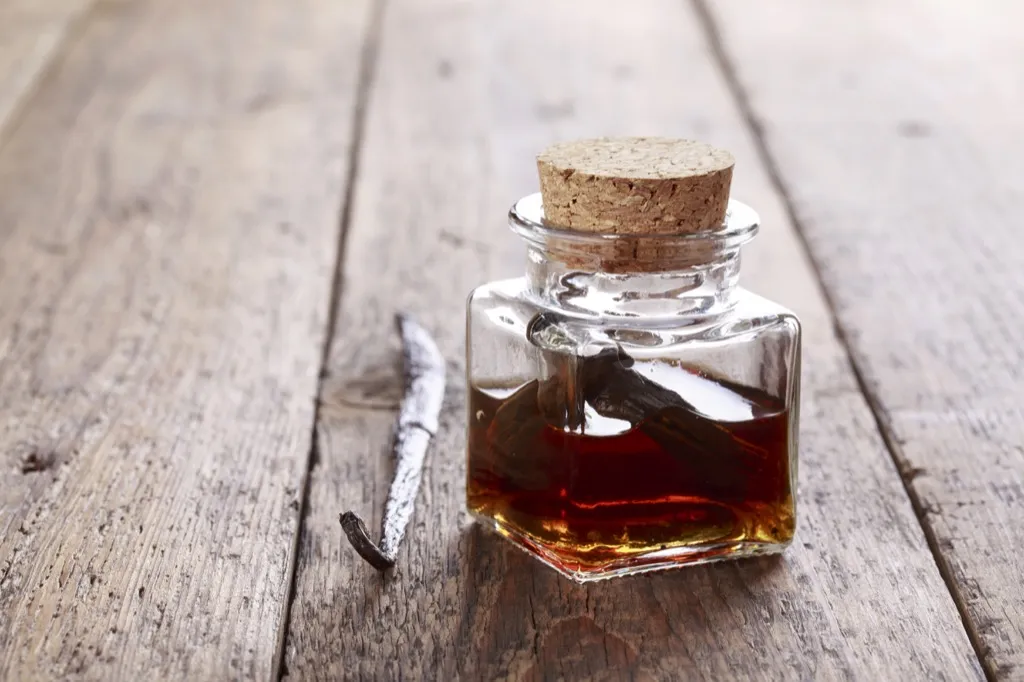
The next time you eat something that flaunts the rich flavor of vanilla, you might want to be aware of—or do your best to ignore—the fact that castoreum, a goo that beavers excrete to mark their territory, is sometimes used to enhance the flavor of vanilla in food, according to National Geographic. The goo is “generally regarded as a safe additive” by the U.S. Food and Drug Administration, but you’ll probably never come across it in real life because it’s difficult and expensive to collect.
169
The U.S. almost went to war with Canada over a pig.
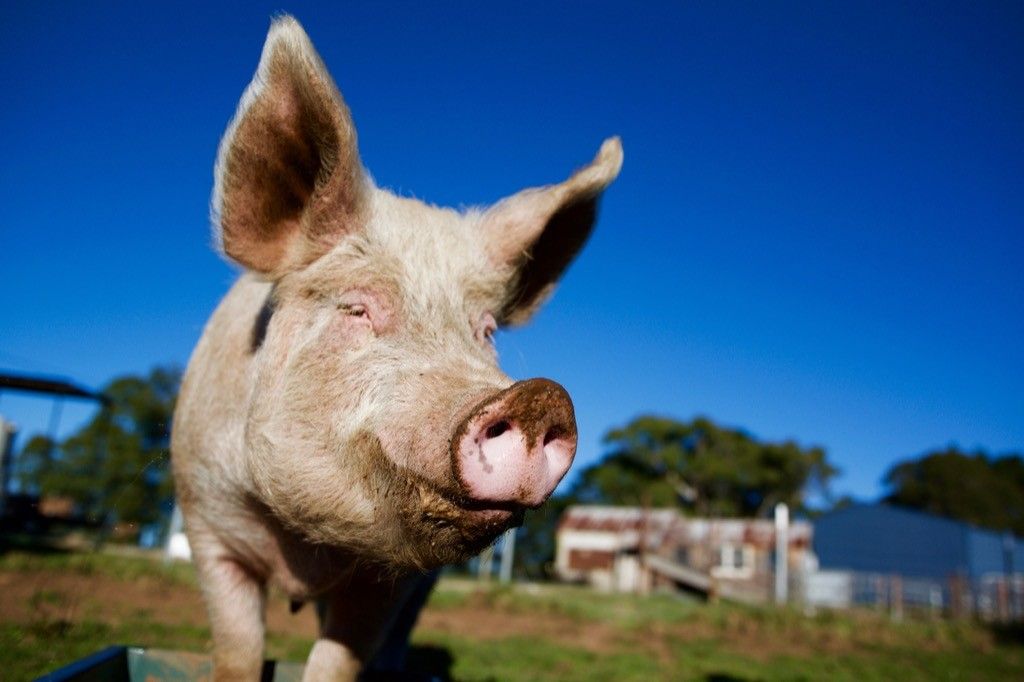
In 1859, the U.S. almost went to war with Canada because of a pig. Just a few years after the Oregon Treaty was signed to end a border dispute between America and Britain (which still ruled over the area that came to be known as Canada), things got a little heated on San Juan Island where citizens from both countries were located. Historic UK explains that “a pig belonging to the British accidentally wandered onto the land of Lyman Cutlar, an American farmer. When Cutlar noticed the pig eating some of his potatoes he was incensed, and in a fit of rage shot and killed the pig.”
Despite efforts to resolve the situation between the two men, things spread into the rest of the community and got to the point where the governor of British Columbia sent three warships to the area. The two sides continued to increase their military force over the following month until British Navy Admiral Robert L. Baynes arrived and ended things by stating that he would not “involve two great nations in a war over a squabble about a pig.”
170
Tornados used to be called “twirlblasts” and “twirlwinds” in the 18th century.
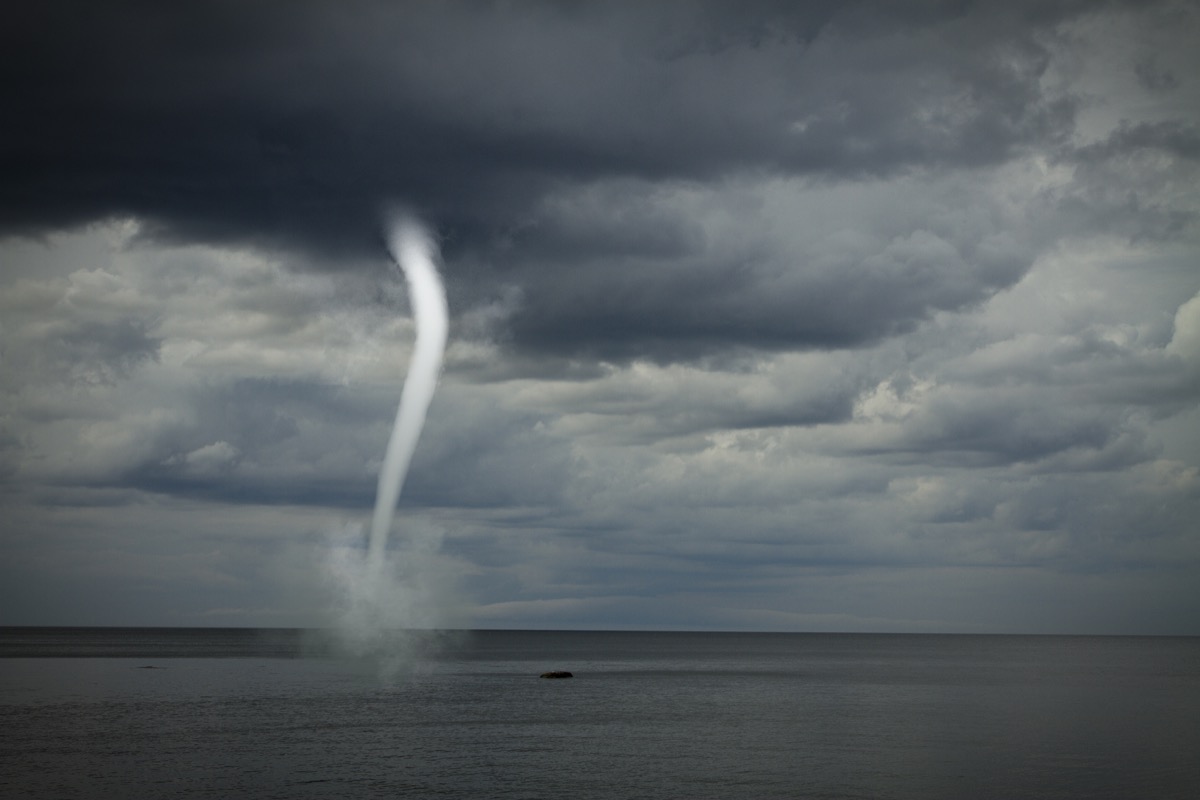
If you lived in the 18th century, you might have referred to tornados using the words “twirlblast” or “twirlwind.” Honestly, we might need to bring these back!
171
The Sundance Kid took his nickname from the town of Sundance, Wyoming.

You may not recognize the name Harry Alonzo Longabaugh, and that’s because he was famously (or infamously) known by his nickname, the Sundance Kid. The American outlaw, who was born in 1868 and was killed in 1908, took his now-historical moniker from the only town that put him behind bars: Sundance, Wyoming. He was jailed there when he was just 15 years old for stealing a horse and was sentenced to 18 months. The Sundance Kid went on to join the Wild Bunch, a group of robbers and rustlers who ranged through the Rocky Mountains in the late 19th century.
172
Eating your offspring may be a sign of good parenting in some species.

The thought of any creature devouring its babies may be horrific to us, but for some animals, such as certain fish, reptiles, and amphibians, that’s not the case, according to 2019 research published in Frontiers in Ecology and Evolution. Among these creatures, sacrificing some of their young via cannibalism may be a way to help their other offspring survive when overcrowding becomes a problem.
173
The word “MacGyvered” is in the Oxford English Dictionary.

The original MacGyver series that ran from 1985 until 1992 featured a main character who could fashion pretty much whatever his heart desired with random objects. As a result, we’ve been using the word “MacGyvered” as an adjective meaning “adapted or improvised in an ingenious or expedient way.” And in March 2019, the term was officially added to the Oxford English Dictionary. It only took 34 years!
174
Kentucky has more bourbon than people.

If bourbon is your drink of choice, then you might want to plan a road trip to Kentucky. The state is not only responsible for 95 percent of the world’s bourbon, according to The Atlantic, but there is also so much of it that the 4.7 million barrels in the state’s distilleries outnumber the 4.3 million people living in the area.
175
Jupiter’s red spot is getting taller and smaller at the same time.

Jupiter’s red spot is almost as well-known as the planet’s remarkable rings. But the spot, which is, in fact, a storm, has been shrinking for a century and a half. Although NASA can’t predict what will happen to the storm that was “once big enough to swallow three Earths with room to spare,” they do know that it “seems to have increased in area at least once along the way, and it’s growing taller as it gets smaller.”